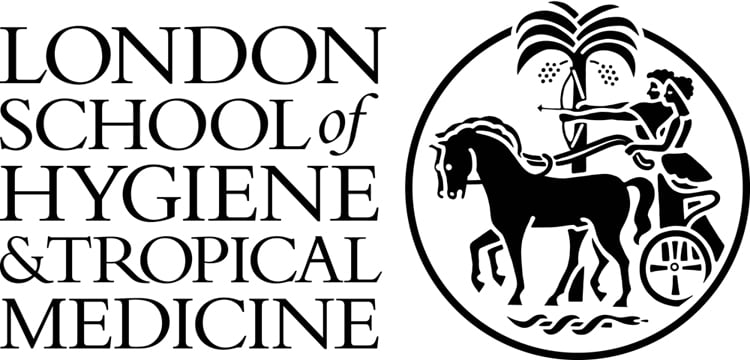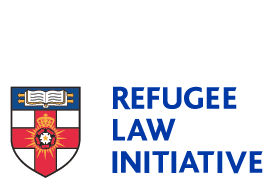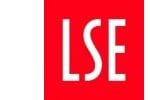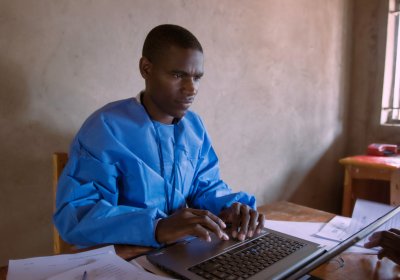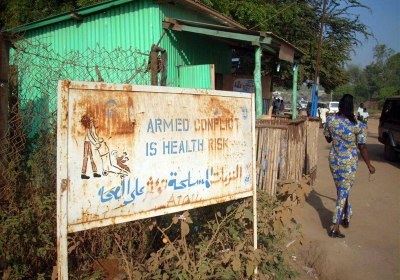RECAP
Research capacity strengthening and knowledge generation to support preparedness and response to humanitarian crises and epidemics.
RECAP focuses on the health and protection sectors in humanitarian response. It will conduct research and strengthen research capacity to improve decision-making and accountability in response to humanitarian crises and epidemics.
This four-year project began in October 2017. It is a partnership between universities in the United Kingdom, Sierra Leone and Lebanon, and some of the leading humanitarian NGOs. RECAP is funded by the Global Challenges Research Fund (GCRF).
RECAP has provided vital support to COVID-19 responses in the UK and countries affected by humanitarian crises. We have published numerous research studies on COVID-19 modelling and transmission reduction strategies and these are all available on our publications page. RECAP-funded staff have also provided expert advice to governments and humanitarian agencies on COVID-19, including membership of the UK’s Scientific Advisory Group for Emergencies (SAGE) and its expert groups, and advising governments and humanitarian agencies in Somalia, Sudan, Yemen and elsewhere.
RECAP’s research portfolio consists of six work streams for conducting research on a range of topics related to humanitarian crises. The work streams cover improved performance metrics, epidemic modelling, applied use of economic methods, use of research and data, accountability, and ethics.
RECAP’s capacity strengthening portfolio consists of four work streams to strengthen research capacity on humanitarian crises. These cover the specific research methods used in RECAP’s research work streams, institutional capacity support, individual researcher career support, and building capability in the United Kingdom.
Toward Leadership Programme
RECAP is partnering with two other GCRF GROW funded projects, the Crick African Network and PRECISE, to strengthen leadership capacity in research institutes across Africa. Ten delegates have been selected from institutes across Africa, including RECAP Partner the University of Sierra Leone, to attend the twelve month training programme. The first training workshop will take place in Johannesburg in February 2019
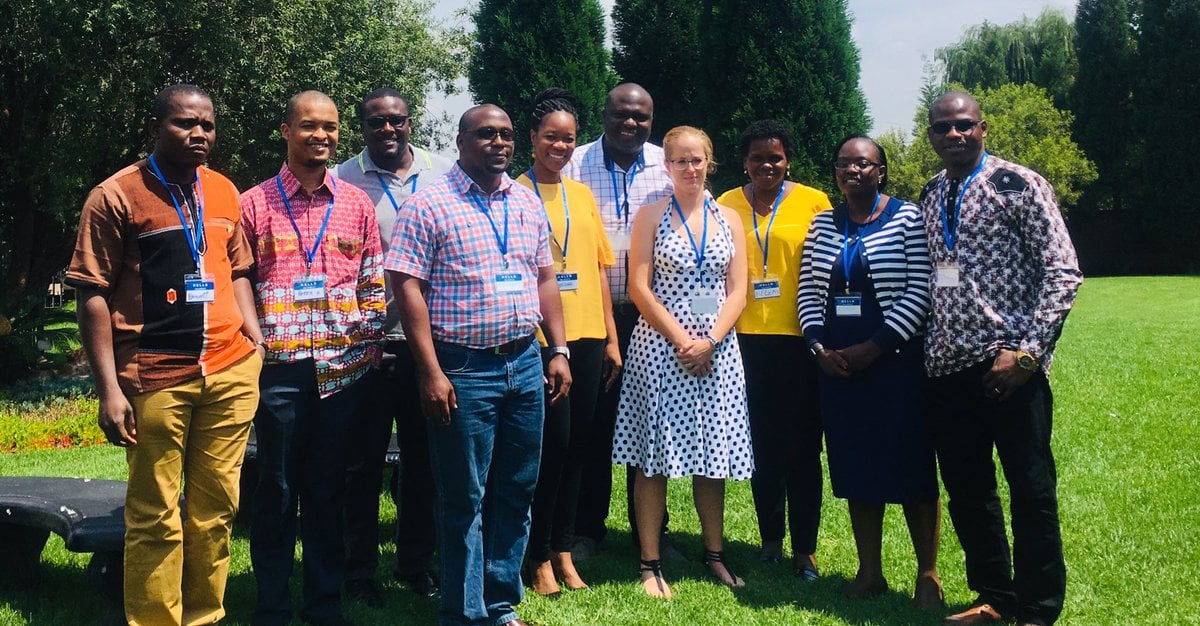
RECAP Event in Freetown - November 2018
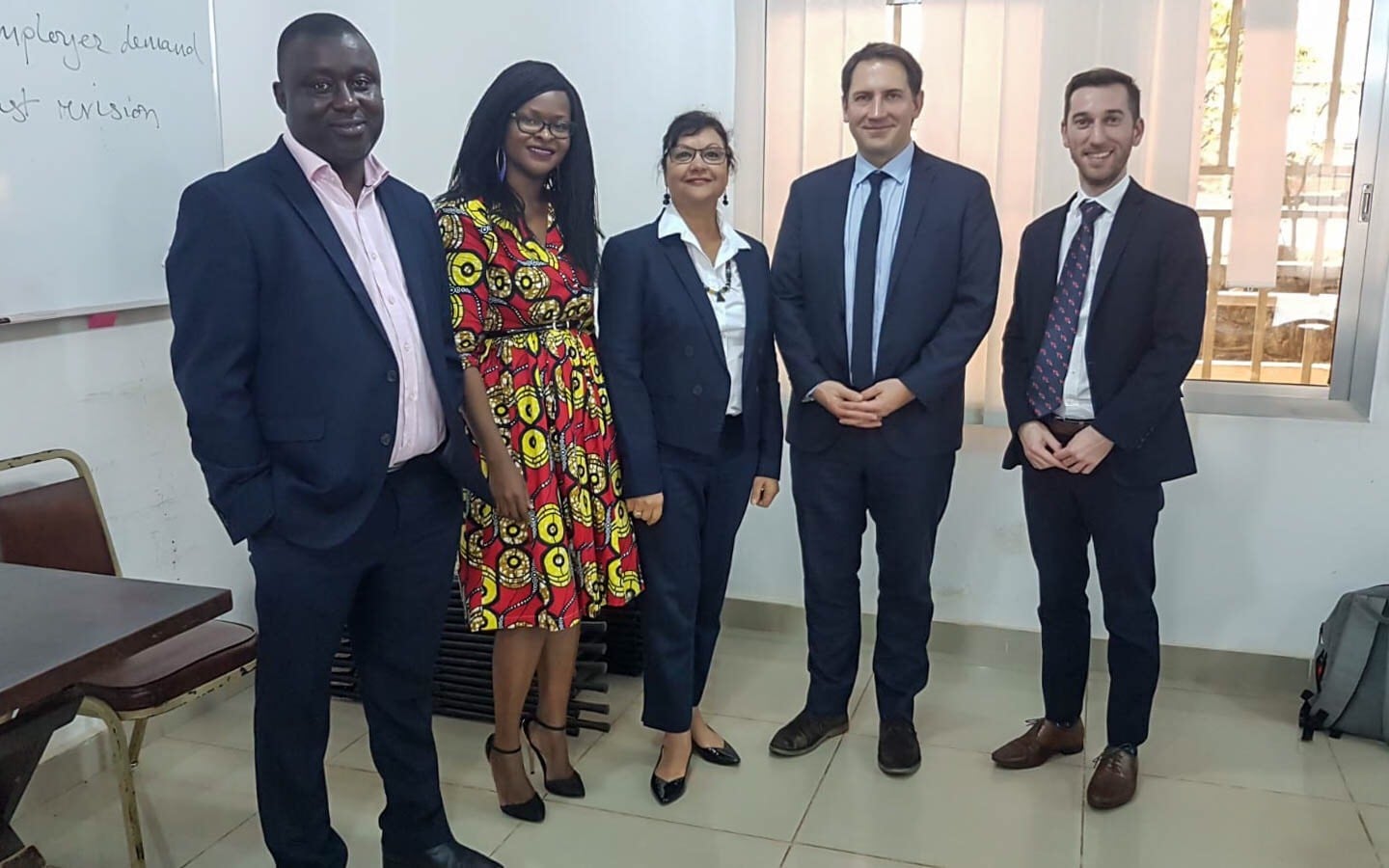
RECAP Launch Meeting - February 2018
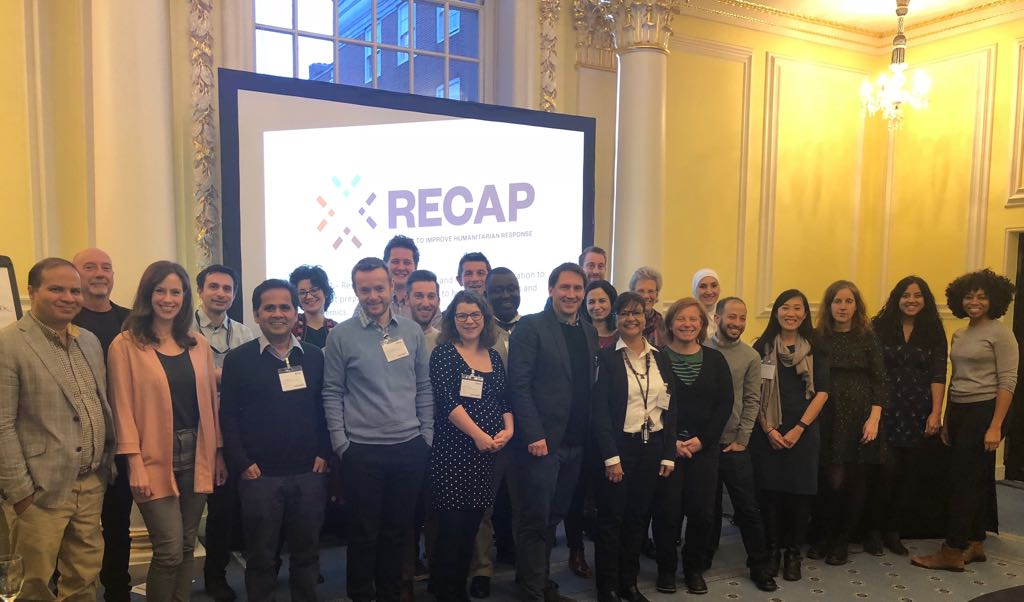
Recent updates
The Refugee Law Initiative (RLI) has been working with prominent international NGO’s – Save the Children and the International Rescue Committee - to support hum
Events
Newsletter
Contact us
Professor Bayard Roberts, Faculty of Public Health and Policy, London School of Hygiene and Tropical Medicine.
Professor Abla Mehio Sibai, Department of Epidemiology & Population Health, Faculty of Health Sciences, American University of Beirut.
Professor Mohamed Samai, College of Medicine and Allied Health Sciences, The University of Sierra Leone
Daniel Mongiardi, RECAP Project Manager, London School of Hygiene and Tropical Medicine
Project rationale
There are an estimated 172 million people worldwide affected by armed conflict, including 59 million people forcefully displaced from their homes as refugees or internally displaced persons (IDPs). In addition, natural disasters affect around 175 million people annually. Outbreaks of infectious diseases often follow on from humanitarian crises and consequent health systems weaknesses. Humanitarian crises and their impact on health, protection and related sectors pose major obstacles to international development and the achieving the Sustainable Development Goals (SDGs).
Effective decision-making by humanitarian actors is vital to the effectiveness of humanitarian responses. Accurate and timely information and evidence is essential in achieving effective decision-making. Yet current humanitarian decision-making and programmes are impeded by limited data, evidence, capacity, guidance, and ethical preparedness. Accountability is a vital component in improving humanitarian responses and is reliant on good information and evidence. However, gaps remain in understanding and implementation of accountability mechanisms.
Vision and activities
RECAP’s vision is to strengthen research capacity and capability to generate knowledge on how to improve decision-making and accountability to help support preparedness and response to humanitarian crises and epidemics.
RECAP focuses on the sectors of health and protection. It has six research Work Streams and four capacity strengthening Work Streams.
The 6 research work streams
- Work Stream One: Developing and evaluating improved metrics to support humanitarian response
The objective is to develop, pilot and evaluate the application of improved metrics for agency and sector performance in humanitarian settings. The activities involve identifying a set of service availability, coverage and quality indicators to quantify the performance of humanitarian responses aimed at reducing excess morbidity and mortality and improving human security. We will then develop methods to rapidly quantify each indicator in a crisis context, ranging from analysis of programmatic data to rapid service audits to small sample surveys. We will then develop an open access software platform and set of guidance documents to enable implementation of this work by humanitarian staff. Feasibility of the methodology will be explored through qualitative research and economic analysis.
Lead: Francesco Checchi
- Work Stream Two: Strengthening epidemic modelling for real-time decision-making
The objective is to develop and apply new modelling techniques for epidemic preparedness and response to guide real-time decision-making. The methods involve collecting and combining data from a large number of previous outbreaks for our chosen disease case studies. For each outbreak we will simultaneously collate data on population and turnover estimates, relevant environmental factors, host factors and timelines of key events. Field surveys will also be performed in a range of settings to obtain estimates of transmission related parameters (including demographic and behavioural parameters). For the analysis, spatially explicit statistical models will be fitted to the outbreak data to describe and quantify associations between outcome variables and inputs. Mechanistic models will also be developed and fitted to the data using Bayesian methods to gain a better understanding of key variables (identified from the statistical analysis) on the observed epidemiological picture and impact of control policies. The models will inform a real-time platform to assess epidemic progression and policy evaluation. The results will help improve preparedness for future outbreaks and provide input to the design of appropriate indicators.
Lead: John Edmunds
- Work Stream Three: Applied use of economic methods in humanitarian crises
The objective is to develop and apply economic methods to inform decision-making in humanitarian settings. More specifically, it seeks to: (i) examine population and provider preferences for financing and human resource arrangements and coverage; (ii) estimate the costs and cost-effectiveness of interventions and packages of care to inform resource allocation decisions; (iii) examine trends in levels and the nature of external humanitarian funds, external aid flows for the general population, and government funding before and during humanitarian crises; and (iv) develop toolkits to inform decision making on preferred models of financing, cost-effectiveness and packages of care in crisis settings. Methods include conducting surveys and qualitative research, collection of routine data, and analysis of national government spending and international aid flows.
Lead: Josephine Borghi
- Work Stream Four: Improved use of data for decision-making by humanitarian agencies
The objective is to evaluate the current use of data and evidence in operational decision-making and the potential for innovative decision-making approaches and technologies in humanitarian settings. The methods include: literature review; an online survey to characterise currently used information systems and to identify supportive features; qualitative and more ethnographic research with RECAP members and other key stakeholders, including drawing on examples and case-studies emerging from across other RECAP research Work Streams. We will evaluate information systems use through country case studies embedded in crisis-affected settings using qualitative methods, health economics, and information science.
Lead: Karl Blanchet
- Work Stream Five: Exploring accountability and enforcement frameworks in humanitarian crises
The objective is to explore accountability frameworks and enforcement mechanisms in humanitarian settings. The methods include legal and social sciences research methods through desk-based research and field work in in Lebanon, Sierra Leone, Myanmar, northern Uganda and South Sudan. The field studies draw on ethnographic and qualitative research with crisis-affected and forcibly displaced individuals and those involved in organising and providing humanitarian services. This participatory methodology intends to facilitate joint knowledge production and explore how the capabilities of beneficiaries to hold humanitarian actors to account can be enhanced.
Health leads: Melissa Parker and Tim Allen
Protection lead: David Cantor
- Work Stream Six: Exploring ethical preparedness and provision in humanitarian crises
The objective is to explore and support ethical preparedness and provision in humanitarian crises. The specific research questions include: (i) what are ethical issues experienced by frontline humanitarian staff and what are some of the solutions they’ve devised? (ii) In what ways can ethically informed practice be supported among frontline staff? (iii) How can ethical issues around health and protection work and research on child, family and gender-based be better understood and addressed? The research methods include ethnographic and qualitative research with crisis-affected and forcibly displaced individuals and those involved in organising and providing humanitarian services.
Lead: Patricia Kingori
The 4 capacity strengthening work streams
- Work Stream 7: Strengthening capacity in research methods
We will conduct training on the methods used in the RECAP Research Streams to support applied learning through the inclusion of local researchers in the design, conduct, analysis and write-up of the research. The training activities listed here mainly take place at the University of Sierra Leone and the American University of Beirut and through online materials, and be open to university and NGO partners and selected key stakeholders.
- Work Stream 8: Strengthening institutional capacity for conducting humanitarian research
We seek to enhance institutional research capacity to develop a sustainable and supportive research environment. Key activities include: support for new or existing institutional group within the University of Sierra Leone and the American University of Beirut with a particular focus on humanitarian-related research; establishing or supporting existing multi-disciplinary research groups; conducting a needs assessment at the University of Sierra Leone and the American University of Beirut focusing on six research capacity management and support themes.
- Work Stream 9: Supporting individual researcher capability and career progression
RECAP will provide the following specific support to individual researchers at the University of Sierra Leone and the American University of Beirut: postdoctoral support, include two fellowships; a research leadership programme; a competitive funding scheme of two small grants for early career researchers at the University of Sierra Leone and the American University of Beirut; core training for early/mid-career researchers at the University of Sierra Leone and the American University of Beirut and partner NGOs; placement schemes; a mentoring and development programme for early career researchers; supporting curriculum development; and training on the use of research /information for humanitarian decision support for NGO and government decision-makers.
- Work Stream 10: Building capability in the United Kingdom for research on health and protection in humanitarian crises
RECAP will create new positions within the partner universities to strengthen capacity for humanitarian-related research. It will also connect researchers from these universities with our partners at the American University of Beirut and the University of Sierra Leone; and build research networks between university partners and NGOs and strengthen understanding of their different needs, priorities, and challenges.
Expected outputs and outcomes
- A new research network and regional hubs of research excellence and training
- Strengthened research capacity and capability among university and NGO partners to conduct high quality and high impact research
- Scientific research papers and outputs
- Open access software platforms and research guidelines
- Contributions to humanitarian guidelines, programmes and policies
The RECAP leadership team
| Principal Investigators | |
|---|---|
| Overall Principal Investigator | Professor Bayard Roberts (London School of Hygiene and Tropical Medicine) |
| Lebanon Principal Investigator | Professor Abla Mehio Sibai (American University of Beirut) |
| Sierra Leone Principal Investigator | Professor Mohamed Samai (College of Medicine and Allied Health Sciences, University of Sierra Leone) |
Partnership
RECAP is led by the London School of Hygiene and Tropical Medicine in partnership with universities and non-governmental organisations (NGOs) working on health and protection in humanitarian crises.
RECAP uses a hub-and-spoke model; with hubs of Lebanon, Sierra Leone, and UK for capacity strengthening and research; and spokes of further research sites in NGO partner programmes in countries affected by humanitarian crises. The partners are:
Recent updates
The Refugee Law Initiative (RLI) has been working with prominent international NGO’s – Save the Children and the International Rescue Committee - to support hum
Events
Newsletter
Contact us
Professor Bayard Roberts, Faculty of Public Health and Policy, London School of Hygiene and Tropical Medicine.
Professor Abla Mehio Sibai, Department of Epidemiology & Population Health, Faculty of Health Sciences, American University of Beirut.
Professor Mohamed Samai, College of Medicine and Allied Health Sciences, The University of Sierra Leone
Daniel Mongiardi, RECAP Project Manager, London School of Hygiene and Tropical Medicine
RECAP supporting COVID-19 responses
RECAP has provided vital support to COVID-19 responses in the UK and countries affected by humanitarian crises. We have published numerous research studies on COVID-19 modelling and transmission reduction strategies and these are all available on our publications page. RECAP-funded staff have also provided expert advice to governments and humanitarian agencies on COVID-19, including membership of the UK’s Scientific Advisory Group for Emergencies (SAGE) and its expert groups, and advising governments and humanitarian agencies in Somalia, Sudan, Yemen and elsewhere.
Featured publications:
Clark, A. et al. 2020. Global, regional, and national estimates of the population at increased risk of severe COVID-19 due to underlying health conditions in 2020: a modelling study. Lancet Global Health.
Garry, S. et al. 2020. Considerations for planning COVID-19 case management services in humanitarian responses. Conflict and Health.
Makhoul, M et al. 2020. Epidemiological Impact of SARS-CoV-2 Vaccination: Mathematical Modeling Analyses. Vaccines.
Parker, M. et al. 2020. COVID-19, Public Authority and Enforcement. Medical Anthropology.
Singh, L. et al. 2020. What does ‘leave no one behind’mean for humanitarian crises-affected populations in the COVID-19 pandemic? BMJ Global Health.
Recent updates
The Refugee Law Initiative (RLI) has been working with prominent international NGO’s – Save the Children and the International Rescue Committee - to support hum
Events
Newsletter
Contact us
Professor Bayard Roberts, Faculty of Public Health and Policy, London School of Hygiene and Tropical Medicine.
Professor Abla Mehio Sibai, Department of Epidemiology & Population Health, Faculty of Health Sciences, American University of Beirut.
Professor Mohamed Samai, College of Medicine and Allied Health Sciences, The University of Sierra Leone
Daniel Mongiardi, RECAP Project Manager, London School of Hygiene and Tropical Medicine
RECAP’s research portfolio consists of the following six Work Streams.
- Work Stream One: Developing and evaluating improved metrics to support humanitarian response
The objective is to develop, pilot and evaluate the application of improved metrics for agency and sector performance in humanitarian settings. The activities involve identifying a set of service availability, coverage and quality indicators to quantify the performance of humanitarian responses aimed at reducing excess morbidity and mortality and improving human security. We will then develop methods to rapidly quantify each indicator in a crisis context, ranging from analysis of programmatic data to rapid service audits to small sample surveys. We will then develop an open access software platform and set of guidance documents to enable implementation of this work by humanitarian staff. Feasibility of the methodology will be explored through qualitative research and economic analysis.
Lead: Francesco Checchi
- Work Stream Two: Strengthening epidemic modelling for real-time decision-making
The objective is to develop and apply new modelling techniques for epidemic preparedness and response to guide real-time decision-making. The methods involve collecting and combining data from a large number of previous outbreaks for our chosen disease case studies. For each outbreak we will simultaneously collate data on population and turnover estimates, relevant environmental factors, host factors and timelines of key events. Field surveys will also be performed in a range of settings to obtain estimates of transmission related parameters (including demographic and behavioural parameters). For the analysis, spatially explicit statistical models will be fitted to the outbreak data to describe and quantify associations between outcome variables and inputs. Mechanistic models will also be developed and fitted to the data using Bayesian methods to gain a better understanding of key variables (identified from the statistical analysis) on the observed epidemiological picture and impact of control policies. The models will inform a real-time platform to assess epidemic progression and policy evaluation. The results will help improve preparedness for future outbreaks and provide input to the design of appropriate indicators.
Lead: John Edmunds
- Work Stream Three: Applied use of economic methods in humanitarian crises
The objective is to develop and apply economic methods to inform decision-making in humanitarian settings. More specifically, it seeks to: (i) examine population and provider preferences for financing and human resource arrangements and coverage; (ii) estimate the costs and cost-effectiveness of interventions and packages of care to inform resource allocation decisions; (iii) examine trends in levels and the nature of external humanitarian funds, external aid flows for the general population, and government funding before and during humanitarian crises; and (iv) develop toolkits to inform decision making on preferred models of financing, cost-effectiveness and packages of care in crisis settings. Methods include conducting surveys and qualitative research, collection of routine data, and analysis of national government spending and international aid flows.
Lead: Sandra Mounier-Jack
- Work Stream Four: Improved use of data for decision-making by humanitarian agencies
The objective is to evaluate the current use of data and evidence in operational decision-making and the potential for innovative decision-making approaches and technologies in humanitarian settings. The methods include: literature review; an online survey to characterise currently used information systems and to identify supportive features; qualitative and more ethnographic research with RECAP members and other key stakeholders, including drawing on examples and case-studies emerging from across other RECAP research Work Streams. We will evaluate information systems use through country case studies embedded in crisis-affected settings using qualitative methods, health economics, and information science.
Lead: Bayard Roberts
- Work Stream Five: Exploring accountability and enforcement frameworks in humanitarian crises
The objective is to explore accountability frameworks and enforcement mechanisms in humanitarian settings. The methods include legal and social sciences research methods through desk-based research and field work in in Lebanon, Sierra Leone, Myanmar, northern Uganda and South Sudan. The field studies draw on ethnographic and qualitative research with crisis-affected and forcibly displaced individuals and those involved in organising and providing humanitarian services. This participatory methodology intends to facilitate joint knowledge production and explore how the capabilities of beneficiaries to hold humanitarian actors to account can be enhanced.
Health leads: Melissa Parker and Tim Allen
Protection lead: David Cantor and Sarah Singer
- Work Stream Six: Exploring ethical preparedness and provision in humanitarian crises
The objective is to explore and support ethical preparedness and provision in humanitarian crises. The specific research questions include: (i) what are ethical issues experienced by frontline humanitarian staff and what are some of the solutions they’ve devised? (ii) In what ways can ethically informed practice be supported among frontline staff? (iii) How can ethical issues around health and protection work and research on child, family and gender-based be better understood and addressed? The research methods include ethnographic and qualitative research with crisis-affected and forcibly displaced individuals and those involved in organising and providing humanitarian services.
Lead: Patricia Kingori
Recent updates
The Refugee Law Initiative (RLI) has been working with prominent international NGO’s – Save the Children and the International Rescue Committee - to support hum
Events
Newsletter
Contact us
Professor Bayard Roberts, Faculty of Public Health and Policy, London School of Hygiene and Tropical Medicine.
Professor Abla Mehio Sibai, Department of Epidemiology & Population Health, Faculty of Health Sciences, American University of Beirut.
Professor Mohamed Samai, College of Medicine and Allied Health Sciences, The University of Sierra Leone
Daniel Mongiardi, RECAP Project Manager, London School of Hygiene and Tropical Medicine
RECAP’s capacity building portfolio is addressed through the following four work streams.
- Work Stream 7: Strengthening capacity in research methods
We will conduct training on the methods used in the RECAP Research Streams to support applied learning through the inclusion of local researchers in the design, conduct, analysis and write-up of the research. The training activities listed here mainly take place at the University of Sierra Leone and the American University of Beirut and through online materials, and be open to university and NGO partners and selected key stakeholders.
- Work Stream 8: Strengthening institutional capacity for conducting humanitarian research
We seek to enhance institutional research capacity to develop a sustainable and supportive research environment. Key activities include: support for new or existing institutional group within the University of Sierra Leone and the American University of Beirut with a particular focus on humanitarian-related research; establishing or supporting existing multi-disciplinary research groups; conducting a needs assessment at the University of Sierra Leone and the American University of Beirut focusing on six research capacity management and support themes.
- Work Stream 9: Supporting individual researcher capability and career progression
RECAP will provide the following specific support to individual researchers at the University of Sierra Leone and the American University of Beirut: postdoctoral support, include two fellowships; a research leadership programme; a competitive funding scheme of two small grants for early career researchers at the University of Sierra Leone and the American University of Beirut; core training for early/mid-career researchers at the University of Sierra Leone and the American University of Beirut and partner NGOs; placement schemes; a mentoring and development programme for early career researchers; supporting curriculum development; and training on the use of research /information for humanitarian decision support for NGO and government decision-makers.
- Work Stream 10: Building capability in the United Kingdom for research on health and protection in humanitarian crises
RECAP will create new positions within the partner universities to strengthen capacity for humanitarian-related research. It will also connect researchers from these universities with our partners at the American University of Beirut and the University of Sierra Leone; and build research networks between university partners and NGOs and strengthen understanding of their different needs, priorities, and challenges.
Capacity strengthening leads:
- Dr. Caitlin Wake (London School of Hygiene and Tropical Medicine)
- Dr. Haja Wurie Ramatulai (College of Medicine and Allied Health Sciences)
- Professor Jocelyn DeJong (American University of Beirut)
Completed capacity strengthening activities
- Research capacity strengthening needs assessments were conducted at the University of Sierra Leone (USL) and the American University of Beirut (AUB). The completed reports identified recommendations for strengthening research capacity at the universities.
- Two researchers based at USL attended a research leadership development programme. It supported them in developing personal and professional skills to conduct high-impact humanitarian-related research and lead research within their institution.
- Four seed grants were awarded to early career researchers at AUB and USL. These awards are to support the research and career development of early-career researchers conducting research on humanitarian issues.
- Training and secondments that have taken place include:
- A training workshop held by AUB on grant writing. It took place online over five days, with 150 registered participants from across the region
- A workshop on publication writing was held at Njala University in Sierra Leone
- An LSHTM short course on outbreak analytics was developed and held
- RECAP researchers were deployed to support NGOs with the flood response in Mozambique; a multi sector needs assessment in Afghanistan; and the Ebola response in the Democratic Republic of Congo
Ongoing or planned capacity strengthening activities
- A capacity strengthening programme is being held for MSF health advisors on using public health information for needs analysis and project monitoring. Materials will be publicly available following the completion of the course.
- Save the Children is running research capacity strengthening training programmes in three country offices.
- Research leadership development programmes will be held at AUB and USL to support early career researchers in developing personal and professional skills to conduct high-impact humanitarian-related research.
- Pilot mentorship programmes will be developed at AUB and USL to provide researchers with structured mentoring and personal development planning.
- The Refugee Law Initiative is developing an online course on accountability in humanitarian crises
- BRAC will hold an online training on impact evaluation
- A short course will be developed on economic evaluation
- Other training and courses will be developed to be responsive to the needs of RECAP partners or emergent needs related to humanitarian crises. Those that are publicly available will be listed below.
External training opportunities
- Health in Humanitarian Crises. A free online course developed by LSHTM.
- LSHTM Conflict and Health MSc module. Contact Jennifer.Palmer@lshtm.ac.uk
- LSHTM Conflict and Health MSc module (distance-learning). Contact Joshua.Mendelsohn@lshtm.ac.uk
- LSHTM Nutrition in Emergencies MSc module. Contact marko.kerac@lshtm.ac.uk
- Epidemiological tools in conflict-affected populations. A free online resource developed by LSHTM which is targeted at non-epidemiologists and policy makers operating in humanitarian crises
- Ebola in Context: understanding Transmission, Response and Control. A free online course developed by LSHTM.
Recent updates
The Refugee Law Initiative (RLI) has been working with prominent international NGO’s – Save the Children and the International Rescue Committee - to support hum
Events
Newsletter
Contact us
Professor Bayard Roberts, Faculty of Public Health and Policy, London School of Hygiene and Tropical Medicine.
Professor Abla Mehio Sibai, Department of Epidemiology & Population Health, Faculty of Health Sciences, American University of Beirut.
Professor Mohamed Samai, College of Medicine and Allied Health Sciences, The University of Sierra Leone
Daniel Mongiardi, RECAP Project Manager, London School of Hygiene and Tropical Medicine
- Work Stream One: Developing and evaluating improved metrics to support humanitarian response
-
Evaluating COVID-19: Decision-making in humanitarian settings: the case study of Somalia. Warsame A, Fuje M, Blanchet K, Checchi F, Palmer J. (2022). PLoS Global Public Health 2(3): e0000192.
A method for small-area estimation of population mortality in settings affected by crises. Checchi. F., Testa, A., Gimma, A., Koum-Besson, E. & Warsame, A. 2022. Popul Health Metr, 20(4).
Public and health professional epidemic risk perceptions in countries that are highly vulnerable to epidemics: a systematic review. Abdelmagid, N., Checchi, F. & Roberts, B. 2022. Infect Dis Poverty, 5,11(1):4
Healthcare governance during humanitarian responses: a survey of current practice among international humanitarian actors. Jarrett, P., Fozdar, Y., Abdelmagid, N. & Checchi, F. 2021. Confl Health, 10;15(1):25.
COVID-19 control in low-income settings and displaced populations: what can realistically be done? Dahab, M., van Zandvoort, K., Flasche, S., Warsame, A., Ratnayake, R., Favas, C., Spiegel, P.B., Waldman, R.J. & Checchi, F. 2020. Conflict and Health, 14(1).
Mobile clinics in humanitarian emergencies: a systematic review. McGowan, C.R., Baxter, L., Deola, C., Gayford, M., Marston, C., Cummings, R. & Checchi, F. 2020. Conflict and Health, 14(4).
Guidance for the prevention of COVID-19 infections among high-risk individuals in camps and camp-like settings. Favas, C. 2020. London School of Hygiene and Tropical Medicine, Report.
Considerations for planning COVID-19 case management services in humanitarian responses.
Garry, S., Abdelmagid, N., Baxter, L., Roberts, N., le Polain de Waroux, O., Ismail, S., Ratnayake, R., Favas, C., Lewis, E. & Checchi, F. 2020. Conflict and Health (in Press).
Towards systematic evaluation of epidemic responses during humanitarian crises: A scoping review of existing public health evaluation frameworks. Warsame, A., Blanchet, K. & Checchi, F. 2020. BMJ Global Health, 5:e002109.
The practice of evaluating epidemic response in humanitarian and low-income settings: a systematic review. Warsame, A., Murray, J., Gimma, A. & Checchi, F. 2020. BMC Medicine, 18(315).
Defining, measuring and interpreting the appropriateness of humanitarian assistance. Abdelmagid, N., Checchi, F. & Garry, S. 2019. Journal of International Humanitarian Action, 4(14).
What influenced provision of non-communicable disease healthcare in the Syrian conflict, from policy to implementation? A qualitative study. Garry, S., Checchi, F. & Cislaghi, B. 2018. Conflict and Health, 12(45).
Health status of returning refugees, internally displaced persons, and the host community in a post-conflict district in northern Sri Lanka: a cross-sectional survey. Burns, R., Wickramage, K., Musah, A., Siriwardhana, C. & Checchi, F. 2018. Conflict and Health, 12(41).
- Work Stream Two: Strengthening epidemic modelling for real-time decision-making
-
Worldwide routine immunisation coverage regressed during the first year of the COVID-19 pandemic. Evans, B. & Jombart, T. 2022. Vaccine
The cost of insecurity: from flare-up to control of a major Ebola virus disease hotspot during the outbreak in the Democratic Republic of the Congo. Jombart, T., Jarvis, C.I., Mesfin, S., Tabal, N., Mossoko, M., Mpia, L.M., Abedi, A.A., Chene, S., Forbin, E.E., Belizaire, M.R.D., De Radiguès, X., Ngombo, R., Tutu, Y., Finger, F., Crowe, M., Edmunds, W.J., Nsio, J., Yam, A., Diallo, B., Gueye, A.S., Ahuka-Mundeke, S., Yao, M. & Fall, I.S. 2020. Eurosurveillance, 25(2).
Feasibility of controlling COVID-19 outbreaks by isolation of cases and contacts. Hellewell, J., Abbott, S., Gimma, A., Bosse, N.I., Jarvis, C.I., Russell, T.W., Munday, J.D., Kucharski, A.J., Edmunds, W.J., Funk, S., Eggo, R.M., Sun, F., Flasche, S., Quilty, B.J., Davies, N., Liu, Y., Clifford, S., Klepac, P., Jit, M., Diamond, C., Gibbs, H. & Van Zandvoort, K. 2020. The Lancet Global Health, 8(4).
Effectiveness of airport screening at detecting travellers infected with novel coronavirus (2019-nCoV). Quilty, B.J., Clifford, S., Flasche, S. & Eggo, R.M. 2020. Eurosurveillance, 25(5)
Age-dependent effects in the transmission and control of COVID-19 epidemics. Davies, N.G., Klepac, P., Liu, Y., Prem, K., Jit, M. & Eggo, R.M. 2020. Nature Medicine, 26(8).
Effects of non-pharmaceutical interventions on COVID-19 cases, deaths, and demand for hospital services in the UK: a modelling study. Davies, N.G., Kucharski, A.J., Eggo, R.M., Gimma, A., Edmunds, W.J., on behalf of the Centre for the Mathematical Modelling of Infectious Diseases COVID-19 working group. 2020. Lancet Public Health, 5(7).
Quantifying the impact of physical distance measures on the transmission of COVID-19 in the UK. Jarvis, C.I., Van Zandvoort, K., Gimma, A., Prem, K., Klepac, P., Rubin, G.J. & Edmunds, W.J. 2020. BMC Medicine, 18(1).
Global, regional, and national estimates of the population at increased risk of severe COVID-19 due to underlying health conditions in 2020: a modelling study. Clark, A., Jit, M., Warren-Gash, C., Guthrie, B., Wang, H.H.X., Mercer, S. W., Sanderson, C., McKee, M., Troeger, C., Ong, K.L., Checchi, F., Perel, P., Joseph, S., Gibbs, H.P., Banerjee, A., Eggo, R.M., with the Centre for the Mathematical Modelling of Infectious Diseases COVID-19 working group. 2020. Lancet Global Health,8(8).
The effect of travel restrictions on the geographical spread of COVID-19 between large cities in China: a modelling study. Quilty, B.J., Diamond, C., Liu, Y., Gibbs, H., Russell, T.W., Jarvis, C.I., Prem, K., Pearson, C.A.B., Clifford, S., Flasche, S., Klepac, P., Eggo, R.M. & Jit, M. 2020. BMC Medicine, 18(1).
The impact of COVID-19 control measures on social contacts and transmission in Kenyan informal settlements. Quaife, M., Van Zandvoort, K., Gimma, A., Shah, K., Mccreesh, N., Prem, K., Barasa, E., Mwanga, D., Kangwana, B., Pinchoff, J., Edmunds, W.J., Jarvis, C.I. & Austrian, K. 2020. BMC Medicine, 18(1).
COVID-19 length of hospital stay: a systematic review and data synthesis. Rees, E.M., Nightingale, E.S., Jafari, Y., Waterlow, N.R., Clifford, S., B. Pearson, C.A., Group, C.W., Jombart, T., Procter, S.R. & Knight, G.M. 2020. BMC Medicine, 18(1).
Response strategies for COVID-19 epidemics in African settings: a mathematical modelling study. Van Zandvoort, K., Jarvis, C.I., Pearson, C.A.B., Davies, N.G., Ratnayake, R., Russell, T.W., Kucharski, A.J., Jit, M., Flasche, S., Eggo, R.M. & Checchi, F. 2020. BMC Medicine, 18(1).
Estimating the infection and case fatality ratio for coronavirus disease (COVID-19) using age-adjusted data from the outbreak on the Diamond Princess cruise ship, February 2020. Russell, T.W., Hellewell, J., Jarvis, C.I., Van Zandvoort, K., Abbott, S., Ratnayake, R., Flasche, S., Eggo, R.M., Edmunds, W.J. & Kucharski, A.J. 2020. Eurosurveillance, 25(12).
Estimating the time-varying reproduction number of SARS-CoV-2 using national and subnational case counts [version 2; peer review: awaiting peer review]. Abbott, S., Hellewell, J., Thompson, R.N., Sherratt, K., Gibbs, H.P., Bosse, N.I., Munday, J.D., Meakin, S., Doughty, E.L., Chun, J.Y., Chan, Y.-W.D., Finger, F., Campbell, P., Endo, A., Pearson, C.A.B., Gimma, A., Russell, T., Flasche, S., Kucharski, A.J., Eggo, R.M. & Funk, S. 2020. Wellcome Open Resesarch, 5.
Inferring the number of COVID-19 cases from recently reported deaths [version 1; peer review: 2 approved]. Jombart, T., Van Zandvoort, K., Russell, T.W., Jarvis, C.I., Gimma, A., Abbott, S., Clifford, S., Funk, S., Gibbs, H., Liu, Y., Pearson, C.A.B., Bosse, N.I., Eggo, R.M., Kucharski, A.J. & Edmunds, W.J. 2020. Wellcome Open Research, 5:78.
The contribution of asymptomatic SARS-CoV-2 infections to transmission on the Diamond Princess cruise ship. Emery, J.C., Russell, T.W., Liu, Y., Hellewell, J., Pearson, C.A., with the Centre for Mathematical Modelling of Infectious Diseases COVID-19 Working Group, Knight, G.M., Eggo, R.M., Kucharski, A.J., Funk, S., Flasche, S. & Houben, R.M. 2020. eLife, 9.
Estimating number of cases and spread of coronavirus disease (COVID-19) using critical care admissions, United Kingdom, February to March 2020. Jit, M., Jombart, T., Nightingale, E.S., Endo, A., Abbott, S. & Edmunds, W.J., LSHTM Centre for Mathematical Modelling of Infectious Diseases COVID-19 Working Group, & Edmunds, W.J. 2020. Eurosurveillance, 25(18).
What settings have been linked to SARS-CoV-2 transmission clusters? [version 2; peer review: 2 approved]. Leclerc, Q.J., Fuller, N.M., Knight, L.E., Funk, S. & Knight, G.M. 2020. Wellcome Open Research, 5.
Age could be driving variable SARS-CoV-2 epidemic trajectories worldwide. Ayoub, H.H., Chemaitelly, H., Seedat, S., Mumtaz, G.R., Makhoul, M. & Abu-Raddad, L.J. 2020. PLOS ONE, 15(8).
Can the COVID-19 pandemic still be suppressed? Putting essential pieces together. Mumtaz, G.R., Ayoub, H.H., Makhoul, M., Seedat, S., Chemaitelly, H. & Abu-Raddad, L.J. 2020. Journal of Global Health Report, 4.
Providing context for COVID-19 numbers in the Arab region. Mumtaz, G. 2020. Nature Middle East, April 3.
Epidemic curves made easy using the R package incidence. Kamvar, Z.N., Cai, J., Pulliam, J.R.C., Schumacher, J. & Jombart, T. 2019. F1000Research, 8(139).
Real-time analysis of the diphtheria outbreak in forcibly displaced Myanmar nationals in Bangladesh. Finger, F., Funk, S., White, K., Siddiqui, M.R., Edmunds, W.J. & Kucharski, A.J. 2019. BMC Medicine, 17(1).
Outbreak analytics: a developing data science for informing the response to emerging pathogens. Polonsky, J.A., Baidjoe, A., Kamvar, Z.N., Cori, A., Durski, K., Edmunds, W.J., Eggo, R.M., Funk, S., Kaiser, L., Keating, P., De Waroux, O.L.P., Marks, M., Moraga, P., Morgan, O., Nouvellet, P., Ratnayake, R., Roberts, C.H., Whitworth, J. & Jombart, T. 2019. Philosophical Transactions of the Royal Society B: Biological Sciences, 374(1776).
- Work Stream Three: Applied use of economic methods in humanitarian crises
-
Analysis of health overseas development aid for internally displaced persons in low- and middle-income countries. Roberts, B., Ekezie, W., Jobanputra, K., Smith, J., Ellithy, S., Cantor, D., Singh, N. & Patel, P. 2022. Journal of Migration and Health, 5.
Health care financing arrangements and service provision for Syrian refugees in Lebanon, in Bozorgmehr, K., Roberts, B., Razum, O. & Biddle, L. (Eds.). Health Policy and Systems Responses to Forced Migration. Singh, N.S., Dingle, A., Sabra, A.H., DeJong, J., Pitt, C., Mumtaz, G.R., Sibai, A.M. & Mounier-Jack, S. 2020. Springer International Publishing.
Examining the use of economic evaluations in health-related humanitarian programmes in low- and middle-income countries: a systematic review. Makhani, L.A., Moran, V., Sadique, Z., Singh, N.S., Revill, P. & Roberts, B. 2020. Health Policy and Planning,35(2)
- Work Stream Four: Improved use of data for decision-making by humanitarian agencies
-
"Older people tend to be invisible": a qualitative study exploring the needs and inclusion of older Syrian refugees in the context of compounding crises in host country, Lebanon. Hachem, S., Ali, S., Al-Omari, S. et al. Confl Health 16, 61 (2022).
Ageism, an invisible social determinant of health for older Syrian refugees in Lebanon: a service providers’ perspective. Abi Chahine, M., Kienzler, H. Confl Health 16, 62 (2022).
A conceptual framework for analysing partnership and synergy in a global health alliance: case of the UK Public Health Rapid Support Team. Raftery P, Palmer J, Hossain M. (2021). Health Policy & Planning.
A Scoping Review to Assess Sexual and Reproductive Health Outcomes, Challenges and Recommendations in the Context of Climate Migration. van Daalen, K. R., Dada, S., Issa, R., Chowdhury, M., Jung, L., Singh, L., Stokes, D., Orcutt, M. & Singh, N. 2021. Front. Glob. Womens Health. 2.
An innovative and integrated model for global outbreak response and research - a case study of the UK Public Health Rapid Support Team. (UK-PHRST). Raftery, P., Hossain, M. & Palmer, J. (2021). BMC Public Health, 21(1378).
Contested legitimacy for anthropologists involved in medical humanitarian action: experiences from the 2014-2016 West Africa Ebola epidemic. Lees, S., Palmer, J., Procureur, F. & Blancket, K. 2020. Anthropology & Medicine, 27(2).
The role of gender inclusive leadership during the COVID-19 pandemic to support vulnerable populations in conflict settings.Meagher, K., Singh, N.S. & Patel, P. 2020. BMJ Global Health, 5(9).
What does ‘leave no one behind’mean for humanitarian crises-affected populations in the COVID-19 pandemic? Singh, L., Singh, N.S., Nezafat Maldonado, B., Tweed, S., Blanchet, K. & Graham, W.J. 2020. BMJ Global Health, 5(4)
The Challenges of a Public Health Approach to COVID-19 Amid Crises in Lebanon. DeJong, J. 2020. Middle East Research and Information Project.
Sensing sleeping sickness: local symptom-making in South Sudan. Palmer, J.J. 2019. Medical Anthropology, 39(6).
North-South inequities in research collaboration in humanitarian and conflict contexts. Sibai, A.M., Rizk. A., Coutts, A.P., Monzer, G., Daoud, A., Sullivan, R., Roberts, B., Meho, L.I., Fouad, F.M. & DeJong, J. 2019. Lancet, 394.
A forgotten group during humanitarian crises: a systematic review of sexual and reproductive health interventions for young people including adolescents in humanitarian settings. Jennings, L., George, A.S., Jacobs, T., Blanchet, K. & Singh, N.S. 2019. Conflict and health, 13(1).
Research Evidence in the Humanitarian Sector: A Practice Guide. Blachet, K., Allen, C., Breckon, J., Davies, P., Duclos, D., Jansen, J., Mthiyane, H. & Clarke, M. 2018. London, UK: Evidence Aid, London School of Hygiene and Tropical Medicine and Nesta (Alliance for Useful Evidence).
- Work Stream Five: Exploring accountability and enforcement frameworks in humanitarian crises
-
Rejection and Resilience: Returning from the Lord’s Resistance Army in Northern Uganda. Allen, T., Atingo, J. & Parker, M. 2021. Civil Wars.
When Refugees Care for Refugees in Lebanon: Providing Contextually Appropriate Care from the Ground Up. Duclos, D., Fouad F.M. & Blanchet, K. (2021). Medicine Anthropology Theory, 8(3).
Accountability to Affected Populations in Displacement Contexts and During the Covid-19 Pandemic. Martin, D. (2021). Refugee Law Initiative, in collaboration with the International Rescue Committee, London.
Locating the value of the participatory approach to ‘humanitarian accountability’ in displacement contexts. Mathias, B. (2021). RLI Working Papers Series No 53.
NGO strategies for sex and gender-based violence protection and accountability in long-term displacement settings: Reviewing women’s participation in humanitarian programmes in Dadaab refugee complex. Bottomley, B. (2021). RLI Working Papers Series No 56.
Women Who Dare: Exploring experiences of participation among Rohingya refugees in Bangladesh. Sanchez, B., María, C. (2021). RLI Working Papers Series No 55.
COVID-19 in the Context of Forced Displacement: Perspectives from the Middle East and East Africa. Duclos, D. & Palmer, J. 2020. Social Science & Humanitarian Action Platform.
What Happened to Children Who Returned from the Lord’s Resistance Army in Uganda? Allen, T., Atingo, J., Atim, D., Ocitti, J., Brown, C., Torre, C., Fergus, C.A. & Parker, M. 2020. Journal of Refugee Studies.
COVID-19, Public Authority and Enforcement. Parker, M., MacGregor, H. & Akello, G. 2020. Medical Anthropology, 39(8).
Humanitarian accountability: a conceptual analysis. Daun, J. 2020. Refugee Law Initiative Working Papers Series, Paper No. 41.
Child Participation and Accountability in Save the Children Colombia’s Programming. 2019. Refugee Law Initiative and Save the Children.
Humanitarianism: A Dictionary of Concepts. Allen, T., Macdonald, A. & Radice, H. 2018. Routledge: London.
Accountability, in Humanitarianism: A Dictionary of Concepts. Roberts, B., (Eds.), Allen, T., Macdonald, A. & Radice, H. 2018. Routledge: London.
- Work Stream Six: Exploring ethical preparedness and provision in humanitarian crises
-
Ethical and sociocultural challenges in managing dead bodies during epidemics and natural disasters. Suwalowska, H., Amara, F., Roberts, N. & Kingori, P. (2021). BMJ Global Health.
A graphic elicitation technique to represent patient rights. Mcgowan, C.R., Hellman, N., Baxter, L., Chakma, S., Nahar, S., Daula, A.U., Rowe, K., Gilday, J., Kingori, P., Pounds, R. & Cummings, R. 2020. Conflict and Health. 14(1).
The Ethics of Doing Primary Research with Vulnerable Populations: Facing the Challenges One Step at a Time. Benelli, P. & Low, T. 2019. Forced Migration Review 61.
- Capacity Strengthening
-
The co-production of research between academics, NGOs and communities in humanitarian response: A practice guide. Lokot, M., Wake, C. 2021. London School of Hygiene and Tropical Medicine, United Kingdom.
A narrative review of health research capacity strengthening in low and middle-income countries: lessons for conflict-affected areas. Bowsher, G., Papamichail, A., El Achi, N., Ekzayez, A., Roberts, B., Sullivan, R. & Patel, P. 2019. Global Health, 15(23).
Research Capacity Strengthening Assessment: University of Sierra Leone. McCullough, H. & Ramatulai Wurie, H. 2019. University of Sierra Leone, Report.
- COVID-19
-
Evaluating COVID-19: Decision-making in humanitarian settings: the case study of Somalia. Warsame A, Fuje M, Blanchet K, Checchi F, Palmer J. (2022). PLoS Global Public Health 2(3): e0000192.
Accountability to Affected Populations in Displacement Contexts and During the Covid-19 Pandemic. Martin, D. (2021). Refugee Law Initiative, in collaboration with the International Rescue Committee, London.
COVID-19 in the Middle East and North Africa region: an urgent call for reliable, disaggregated and openly shared data. Wehbe, S., Fahme, S.A., Rizk, A., Mumtaz, G.R., Dejong, J. & Sibai, A.M. 2021. BMJ Global Health. 6 (2). p. e005175.
COVID-19 control in low-income settings and displaced populations: what can realistically be done? Dahab, M., van Zandvoort, K., Flasche. S., Warsame, A., Ratnayake, R., Favas, C., Spiegel, P.B., Waldman R.J. & Checchi, F. 2020. Conflict and Health, 14(1).
Guidance for the prevention of COVID-19 infections among high-risk individuals in camps and camp-like settings. Favas, C. 2020. London School of Hygiene and Tropical Medicine, Report.
Considerations for planning COVID-19 case management services in humanitarian responses. Garry, S., Abdelmagid, N., Baxter, L., Roberts, N., le Polain de Waroux, O., Ismail, S., Ratnayake, R., Favas, C., Lewis, E. & Checchi, F. 2020. Conflict and Health (in Press).
Feasibility of controlling COVID-19 outbreaks by isolation of cases and contacts. Hellewell, J., Abbott, S., Gimma, A., Bosse, N.I., Jarvis, C.I., Russell, T.W., Munday, J.D., Kucharski, A.J., Edmunds, W.J., Funk, S., Eggo, R.M., Sun, F., Flasche, S., Quilty, B.J., Davies, N., Liu, Y., Clifford, S., Klepac, P., Jit, M., Diamond, C., Gibbs, H. & Van Zandvoort, K. 2020. The Lancet Global Health, 8(4).
Effectiveness of airport screening at detecting travellers infected with novel coronavirus (2019-nCoV). Quilty, B.J., Clifford, S., Flasche, S. & Eggo, R.M. 2020. Eurosurveillance, 25(5).
Age-dependent effects in the transmission and control of COVID-19 epidemics. Davies, N.G., Klepac, P., Liu, Y., Prem, K., Jit, M. & Eggo, R.M. 2020. Nature Medicine, 26(8).
Effects of non-pharmaceutical interventions on COVID-19 cases, deaths, and demand for hospital services in the UK: a modelling study. Davies, N.G., Kucharski, A.J., Eggo, R.M., Gimma, A., Edmunds, W.J., on behalf of the Centre for the Mathematical Modelling of Infectious Diseases COVID-19 working group. 2020. Lancet Public Health, 5(7).
Quantifying the impact of physical distance measures on the transmission of COVID-19 in the UK. Jarvis, C.I., Van Zandvoort, K., Gimma, A., Prem, K., Klepac, P., Rubin, G.J. & Edmunds, W.J. 2020. BMC Medicine, 18(1).
Global, regional, and national estimates of the population at increased risk of severe COVID-19 due to underlying health conditions in 2020: a modelling study. Clark, A., Jit, M., Warren-Gash, C., Guthrie, B., Wang, H.H.X., Mercer, S. W., Sanderson, C., McKee, M., Troeger, C., Ong, K.L., Checchi, F., Perel, P., Joseph, S., Gibbs, H.P., Banerjee, A., Eggo, R.M., with the Centre for the Mathematical Modelling of Infectious Diseases COVID-19 working group. 2020. Lancet Global Health,8(8).
The effect of travel restrictions on the geographical spread of COVID-19 between large cities in China: a modelling study. Quilty, B.J., Diamond, C., Liu, Y., Gibbs, H., Russell, T.W., Jarvis, C.I., Prem, K., Pearson, C.A.B., Clifford, S., Flasche, S., Klepac, P., Eggo, R.M. & Jit, M. 2020. BMC Medicine, 18(1).
The impact of COVID-19 control measures on social contacts and transmission in Kenyan informal settlements. Quaife, M., Van Zandvoort, K., Gimma, A., Shah, K., Mccreesh, N., Prem, K., Barasa, E., Mwanga, D., Kangwana, B., Pinchoff, J., Edmunds, W.J., Jarvis, C.I. & Austrian, K. 2020. BMC Medicine, 18(1).
COVID-19 length of hospital stay: a systematic review and data synthesis. Rees, E.M., Nightingale, E.S., Jafari, Y., Waterlow, N.R., Clifford, S., B. Pearson, C.A., Group, C.W., Jombart, T., Procter, S.R. & Knight, G.M. 2020. BMC Medicine, 18(1).
Response strategies for COVID-19 epidemics in African settings: a mathematical modelling study. Van Zandvoort, K., Jarvis, C.I., Pearson, C.A.B., Davies, N.G., Ratnayake, R., Russell, T.W., Kucharski, A.J., Jit, M., Flasche, S., Eggo, R.M. & Checchi, F. 2020. BMC Medicine, 18(1).
Estimating the infection and case fatality ratio for coronavirus disease (COVID-19) using age-adjusted data from the outbreak on the Diamond Princess cruise ship, February 2020. Russell, T.W., Hellewell, J., Jarvis, C.I., Van Zandvoort, K., Abbott, S., Ratnayake, R., Flasche, S., Eggo, R.M., Edmunds, W.J. & Kucharski, A.J. 2020. Eurosurveillance, 25(12).
Estimating the time-varying reproduction number of SARS-CoV-2 using national and subnational case counts [version 2; peer review: awaiting peer review]. Abbott, S., Hellewell, J., Thompson, R.N., Sherratt, K., Gibbs, H.P., Bosse, N.I., Munday, J.D., Meakin, S., Doughty, E.L., Chun, J.Y., Chan, Y.-W.D., Finger, F., Campbell, P., Endo, A., Pearson, C.A.B., Gimma, A., Russell, T., Flasche, S., Kucharski, A.J., Eggo, R.M. & Funk, S. 2020. Wellcome Open Resesarch, 5.
Inferring the number of COVID-19 cases from recently reported deaths [version 1; peer review: 2 approved]. Jombart, T., Van Zandvoort, K., Russell, T.W., Jarvis, C.I., Gimma, A., Abbott, S., Clifford, S., Funk, S., Gibbs, H., Liu, Y., Pearson, C.A.B., Bosse, N.I., Eggo, R.M., Kucharski, A.J. & Edmunds, W.J. 2020. Wellcome Open Research, 5:78.
The contribution of asymptomatic SARS-CoV-2 infections to transmission on the Diamond Princess cruise ship. Emery, J.C., Russell, T.W., Liu, Y., Hellewell, J., Pearson, C.A., with the Centre for Mathematical Modelling of Infectious Diseases COVID-19 Working Group, Knight, G.M., Eggo, R.M., Kucharski, A.J., Funk, S., Flasche, S. & Houben, R.M. 2020. eLife, 9.
Estimating number of cases and spread of coronavirus disease (COVID-19) using critical care admissions, United Kingdom, February to March 2020. Jit, M., Jombart, T., Nightingale, E.S., Endo, A., Abbott, S. & Edmunds, W.J., LSHTM Centre for Mathematical Modelling of Infectious Diseases COVID-19 Working Group, & Edmunds, W.J. 2020. Eurosurveillance, 25(18).
What settings have been linked to SARS-CoV-2 transmission clusters? [version 2; peer review: 2 approved]. Leclerc, Q.J., Fuller, N.M., Knight, L.E., Funk, S. & Knight, G.M. 2020. Wellcome Open Research, 5.
Age could be driving variable SARS-CoV-2 epidemic trajectories worldwide. Ayoub, H.H., Chemaitelly, H., Seedat, S., Mumtaz, G.R., Makhoul, M. & Abu-Raddad, L.J. 2020. PLOS ONE, 15(8).
Can the COVID-19 pandemic still be suppressed? Putting essential pieces together. Mumtaz, G.R., Ayoub, H.H., Makhoul, M., Seedat, S., Chemaitelly, H. & Abu-Raddad, L.J. 2020. Journal of Global Health Report, 4.
Providing context for COVID-19 numbers in the Arab region. Mumtaz, G. 2020. Nature Middle East, April 3.
The Challenges of a Public Health Approach to COVID-19 Amid Crises in Lebanon. DeJong, J. 2020. Middle East Research and Information Project.
The role of gender inclusive leadership during the COVID-19 pandemic to support vulnerable populations in conflict settings.Meagher, K., Singh, N.S. & Patel, P. 2020. BMJ Global Health, 5(9).
COVID-19, Public Authority and Enforcement. Parker, M., MacGregor, H. & Akello, G. 2020. Medical Anthropology, 39(8).
What does ‘leave no one behind’mean for humanitarian crises-affected populations in the COVID-19 pandemic? Singh, L., Singh, N.S., Nezafat Maldonado, B., Tweed, S., Blanchet, K. & Graham, W.J. 2020. BMJ Global Health, 5(4).
Epidemiological Impact of SARS-CoV-2 Vaccination: Mathematical Modeling Analyses. Makhoul, M., Ayoub, H.H., Chemaitelly, H., Seedat, S., Mumtaz, G.R., Al-Omari, S. & Abu-Raddad, L.J. 2020. Vaccines. 8 (4). p. 668.
- Blogs
-
Community engagement and communicating from a distance. Palmer, J. 2020. Series of blog posts for Covid-19 Hygiene Hub.
How global is the Refugee Survey Quarterly? A reflection on author affiliation and knowledge production in the forced migration academic discourse. Hampton, K., McNally, R., Nabugere, M. J. & Rahmin, N. 2020. RLI blog on Refugee Law and Forced Migration, 12 November 2020.
The Colombian Constitutional Court and the Protection of the Right to Health for Venezuelan Migrants. Guerrero, J. 2019. RLI blog on Refugee Law and Forced Migration.
Humanitarian accountability for displaced persons: Where are we at? Daun, J. 2018. RLI blog on Refugee Law and Forced Migration, 2 March 2018.
Recent updates
The Refugee Law Initiative (RLI) has been working with prominent international NGO’s – Save the Children and the International Rescue Committee - to support hum
Events
Newsletter
Contact us
Professor Bayard Roberts, Faculty of Public Health and Policy, London School of Hygiene and Tropical Medicine.
Professor Abla Mehio Sibai, Department of Epidemiology & Population Health, Faculty of Health Sciences, American University of Beirut.
Professor Mohamed Samai, College of Medicine and Allied Health Sciences, The University of Sierra Leone
Daniel Mongiardi, RECAP Project Manager, London School of Hygiene and Tropical Medicine
The Refugee Law Initiative (RLI) has been working with prominent international NGO’s – Save the Children and the International Rescue Committee - to support humanitarian responses during the global COVID-19 pandemic. These research projects examine how the two organisations coped with the challenges posed by the pandemic and adapted their working practices on their accountability to refugees and affected populations during this time of particular global crisis.
Research with Save the Children and partner organisations in Bangladesh evaluated the impact of the COVID-19 emergency on Save the Children’s use of feedback from adults and children, and the ways in which approaches to feedback informed the organisation’s decision-making. Drawing on the Rohingya humanitarian response and selected development programmes across the country, the research provides a valuable tool to support organisational learning by documenting innovations and ways the response can be strengthened, particularly as the organisation seeks to reach and engage with the most vulnerable and remote segments of the populations they serve.
The RLI also collaborated with the International Rescue Committee (IRC) to examine the impact of Covid-19 on IRC Uganda’s humanitarian response and accountability to refugees. This research focused on the adaptation of IRC’s Client Responsiveness approach to accountability in the West Nile, Lamwo and Kiryandongo districts, and the urban area of Kampala. It demonstrates how challenges can be overcome by adapting programming and communication channels, and by finding new and alternative strategies to support refugee populations, including the most vulnerable and persons in remote areas. One key output from this research has been the development of a series of audio podcasts for refugees, a demonstrably effective communication channel, which is currently being piloted by IRC in the West Nile region.
Drawing on these research projects, the RLI has also developed Guidance on Accountability to Affected Populations during COVID-19 and other emergency contexts. This guidance synthesises learning on accountability to affected populations in crises and is designed to an accessible and practical reference point for practitioners working in COVID-19 and other crisis contexts across the globe.
Dr Sarah Singer talks about the RLI’s research on accountability during COVID-19 in this short video. You can also view a presentation on the Uganda and Bangladesh research projects in this webinar recording.
This research was funded by the Global Challenges Research Fund (GCRF) as part of the RECAP Project: ‘Research capacity strengthening and knowledge generation to support preparedness and response to humanitarian crises and epidemics,’ grant number ES/P010873/1.
The Refugee Law Initiative (RLI) has undertaken research supporting the humanitarian response in Uganda and Tanzania. This research collaboration with the International Rescue Committee (IRC) examines humanitarian organisations’ responsiveness to displaced populations, and how communication with and feedback from such communities is utilised in the humanitarian organisation’s decision-making processes.
During the pandemic, the RLI examined on the impact of Covid-19 on IRC Uganda’s humanitarian response and accountability to refugees. The research reveals how humanitarian organisations can be accountable to the communities they serve even during a pandemic when engagement between humanitarian staff and affected populations is heavily restricted. It demonstrates how challenges can be overcome by adapting programming and communication channels, and by finding new and different strategies to support refugees, reach remote areas and the most vulnerable, strategies which can be applicable in ordinary times too.
In parallel, the RLI undertook research in collaboration with IRC Tanzania. This larger case study examines how the organisation does and can foster meaningful participation of and feedback to refugees, and influence its own staff culture to foster greater receptivity to refugee engagement. Spanning five sectors of the organisation, the research provides a detailed evaluation of the country office’s operation, and key findings and lessons which are relevant and applicable to other IRC country programmes, as well as other humanitarian organisations.
This research has resulted in the development of a series of audio podcasts for refugees. These podcasts aim to empower refugees by providing information on how they can engage with IRC and partner organisations, the importance of their feedback, and how communities can respond to cases of fraud, corruption or sexual exploitation and abuse. Produced in five local languages, these messages are being broadcast by IRC and humanitarian partners in early 2022 in Uganda’s West Nile region. If successful, the initiative will be replicated in other areas of interest within Uganda and serve as a basis for organisational learning in the region.
On December 1, the Refugee Law Initiative (RLI) and RECAP are co-hosting a webinar on Accountability to refugees during the COVID-19 pandemic. The Refugee Law Initiative collaborated with the International Rescue Committee and Save the Children to assess the impact of the Covid-19 pandemic on the humanitarian response and accountability to refugee populations in Uganda and Bangladesh. These case studies provide a timely insight into how these organisations’ communication and accountability strategies have adapted to the challenges posed by the pandemic in markedly different contexts. The webinar discusses the different approaches these organisations have adopted to keep serving affected populations within the restrictions imposed by lockdown regulations and new health risks, to protect their beneficiaries and reach the most vulnerable. To register, and for more information, visit the RLI website.
RECAP staff are proud to contribute to the Health and Internal Displacement Network (HIDN) seminar series. The seminar will be held on 3 November 2021 and you can secure your place now.
RECAP is delighted to support an important new IDP health network. Convenors include RECAP’s Dr. David Cantor and Dr. Bayard Roberts. Watch the recording of the panel launch event held in April 2021 on 'Enabling Health Solutions for Internally Displaced Persons'.
RECAP-funded researchers, Dr. Caitlin Wake and Dr. Michelle Lokot, have written a piece on co-production within research in humanitarian settings. Read more about how co-production can help “enable humanitarian actors to rethink and reshape research partnerships”.
RECAP has provided vital support to COVID-19 responses in the UK and countries affected by humanitarian crises. Find out more about RECAP’s support and research for COVID-19 responses.
RECAP is partnering with Thanzi la Onse to develop the REACT project proposal on refugee policy and financing in East Africa. Please see some reports produced by REACT partners for the development for the REACT proposal.
RECAP partner, BRAC, are hosting capacity building training on Impact Evaluation from April 19-21. The training aims to equip participants with the knowledge of relevance, design, methods and application of Impact Evaluation concepts in Development Policy. The event is free and open to the public. For more information, please read the training agenda, and to register, visit this website.
Researcher Sasha Fahme has written a piece on the potential benefits of “mobilising Syrian refugee healthcare workers in Lebanon to respond to the COVID-19 crisis”.
RECAP partners from the American University of Beirut in Lebanon have collaborated to publish an article highlighting the need for “reliable, disaggregated and openly shared data” on COVID-19 in the Middle-East and North Africa Region.
A video recording is now available of the talks given at the “Defining a Roadmap for Outbreak Analytics” Workshop, which took place in December 2020. This online workshop, organised by Thibaut Jombart of RECAP, showcased talks from experts from around the world.
The capacity strengthening information on our website has been updated to include a comprehensive list of all ongoing, planned, and completed activities. These activities include a capacity strengthening training programme run by Save the Children, an impact evaluation training developed by BRAC and many more. Details and further information can be found on the RECAP Capacity Strengthening page.
RECAP-funded staff have been involved in supporting responses to COVID-19 through research, senior-level policy engagement in the UK and globally, seminars, and media engagement. The extensive published research and guidance on COVID-19 generated by RECAP-funded staff and partners can be found in the RECAP publications page (COVID-19 drop down menu).
As part of RECAP, researchers from the London School of Hygiene and Tropical Medicine and the University of Sierra Leone completed a capacity strengthening assessment at the University of Sierra Leone. This assessment identifies areas for strengthening institutional and individual research capacity, and focuses on key aspects to support good research practice – including research strategies, support services, facilities and infrastructure, human resource management for research, training for researchers, and the external promotion of research. It puts forward recommendations for the University of Sierra Leone to consider, including: infrastructural investment in the libraries, laboratories and research study space; investment, including financial investment in individuals in terms of training and development for researchers and research support staff, and some systems strengthening to support the management of research at all stages of the research cycle. RECAP will support the University of Sierra Leone in prioritising and actioning some of the recommendations. More broadly, the University of Sierra Leone is going through a transformational phase and its commitment to strengthening its research capacity will see future research increasingly being directed and led by the University. The final assessment report can be found here.
A key component of strengthening capacity to respond to humanitarian crises is building resources within organisations and affected countries so that they can respond effectively to future emergencies. RECAP researchers working on epidemic modelling for real-time decision making have been busy using knowledge gained through research to help strengthen capacity through formal training, ad hoc training and deployments.
In the last year, RECAP researchers have provided formal training in outbreak analytics in Malta and Benin, and have an upcoming course planned in Sweden. They have held spatial analysis training in Benin, Lebanon, Antigua and Barbuda, Barbados, and the UK, with more courses planned for next year. These courses have strengthened the capacity of researchers, policy makers and professionals involved in humanitarian response by training people working in government ministries, UN agencies, academic institutions and NGOs how to analyse data during disease outbreaks.
In addition, RECAP modelling experts have been deployed to the field to reach staff on the front lines. Our researchers work together with humanitarian responders, strengthening capacity by collaborating to solve real-time challenges as they emerge, introducing new models and tools, and providing ad hoc training. In the past year, our staff have been deployed to the Democratic Republic of Congo to assist with the Ebola response, and to Mozambique for Cyclone Ida. Through these deployments, they have provided surge capacity, expert support, and advised, mentored and trained individuals, helping humanitarian responders address current crises and prepare for the challenges of the future.
Dr Christopher Jarvis - Research Fellow LSHTM
In June 2019, RECAP and the Firoz Lalji Centre for Africa co-organised a writing workshop for social scientists at Njala University, Sierra Leone. Colleagues from LSHTM (Melissa Parker, Fred Martineau), LSE (Tim Allen and 5 post-docs) and the University of the Andes, Colombia (Maria Del Pilar Lopez Uribe) travelled to Njala to work with 20 Sierra Leonean social scientists. They had diverse academic backgrounds including: history, economics, political science, anthropology, and public health and came from several academic institutions – notably, Njala, University of Sierra Leone's Fourbay College and COMAHS.
During the week, we divided up into small groups to focus on specific pieces of writing that colleagues were trying to complete for their PhDs or publication. This was interwoven with sessions where we met as a single group – either to hear academic seminars about social research on humanitarianism or for specific training on activities such as ‘blog writing’ or ‘doing a literature review’. It was an intense week, with sessions running from 9.00am to 11.00pm – by popular demand!
Although blog writing was optional, the vast majority of people wrote their own blog – and many of these have now been published on the Firoz Lalji Centre for Africa website at LSE. At the beginning of the workshop, a colleague said: “why are you always talking about blogs, blogs and blogs?!” By the end of the week, he answered his own question: “ it is a good and simple way to communicate ideas quickly. Writing a 10,000 word article or chapter of a thesis is daunting, but it becomes easier, if you write up key findings as you go along.”
The workshop also spawned a WhatsApp group where people are sharing chapters of their thesis and conference papers; and it has helped to develop a South-South partnership. We are hoping that the next writing workshop will take place in Bogota, Colombia for PhD students in Sierra Leone and Colombia.
Melissa Parker, Professor of Medical Anthropology, LSHTM
In June 2019 Dr Melissa Parker collaborated with RECAP partners in the UK and Sierra Leone to organise and co-lead a workshop focussed on paper and blog writing at Njala University in Bo, Sierra Leone. More information including blog articles written by participants can be found here.
On Monday 24 June 2019, Professor Bayard Roberts (RECAP PI), Professor Alba Sibai (RECAP Lebanon PI) and Dr Hazel McCullough (RECAP Capacity Strengthening Consultant) presented at the GCRF R4HC-MENA one day symposium on 'Health Research in Conflicts and Complex Environments' at Kings College London. Their presentations ranged from building and sustaining equitable partnerships to the scope of RECAP's Capacity Strengthening activities to scaling up mental health interventions among conflict-affected populations
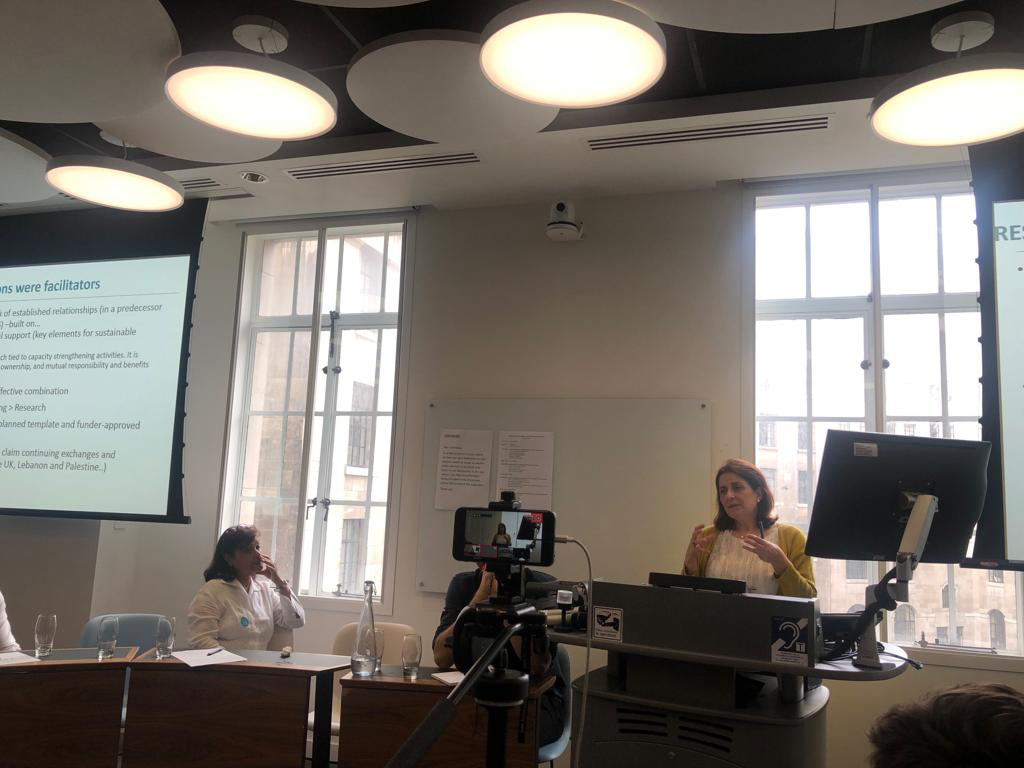
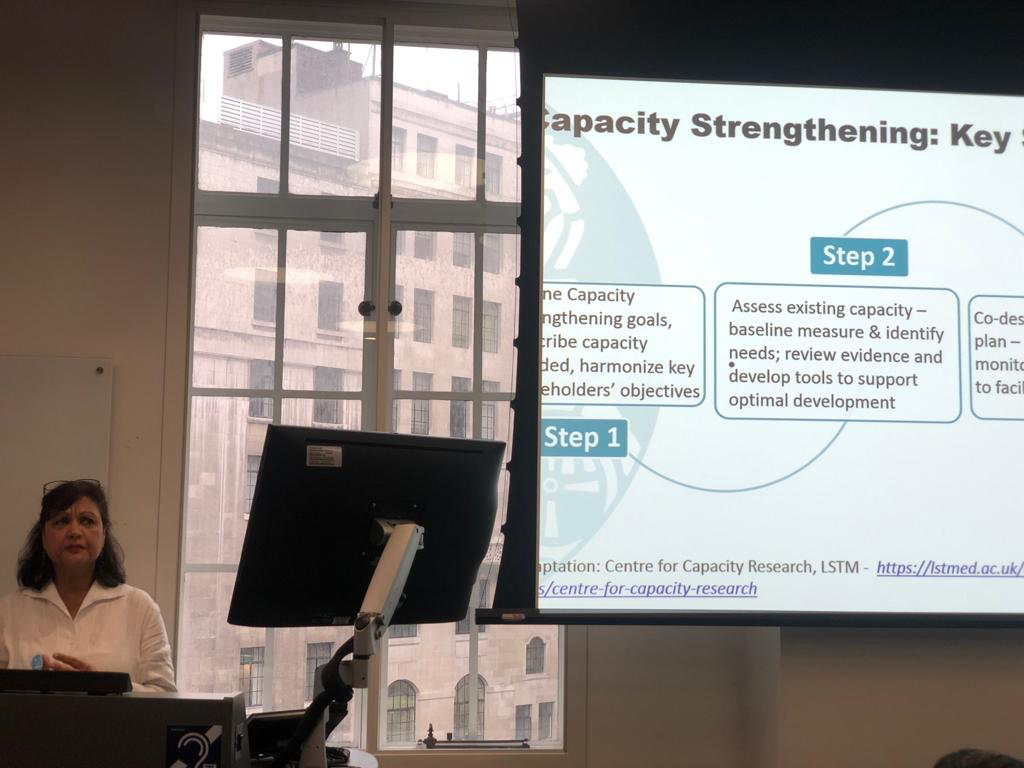
On Tuesday 25th June 2019 join RECAP will be joining the colleagues from the R4HC MENA Project based at Kings College London to discuss Health Research in Conflict & Complex Environments with experts in the field.
Register here for this free event here
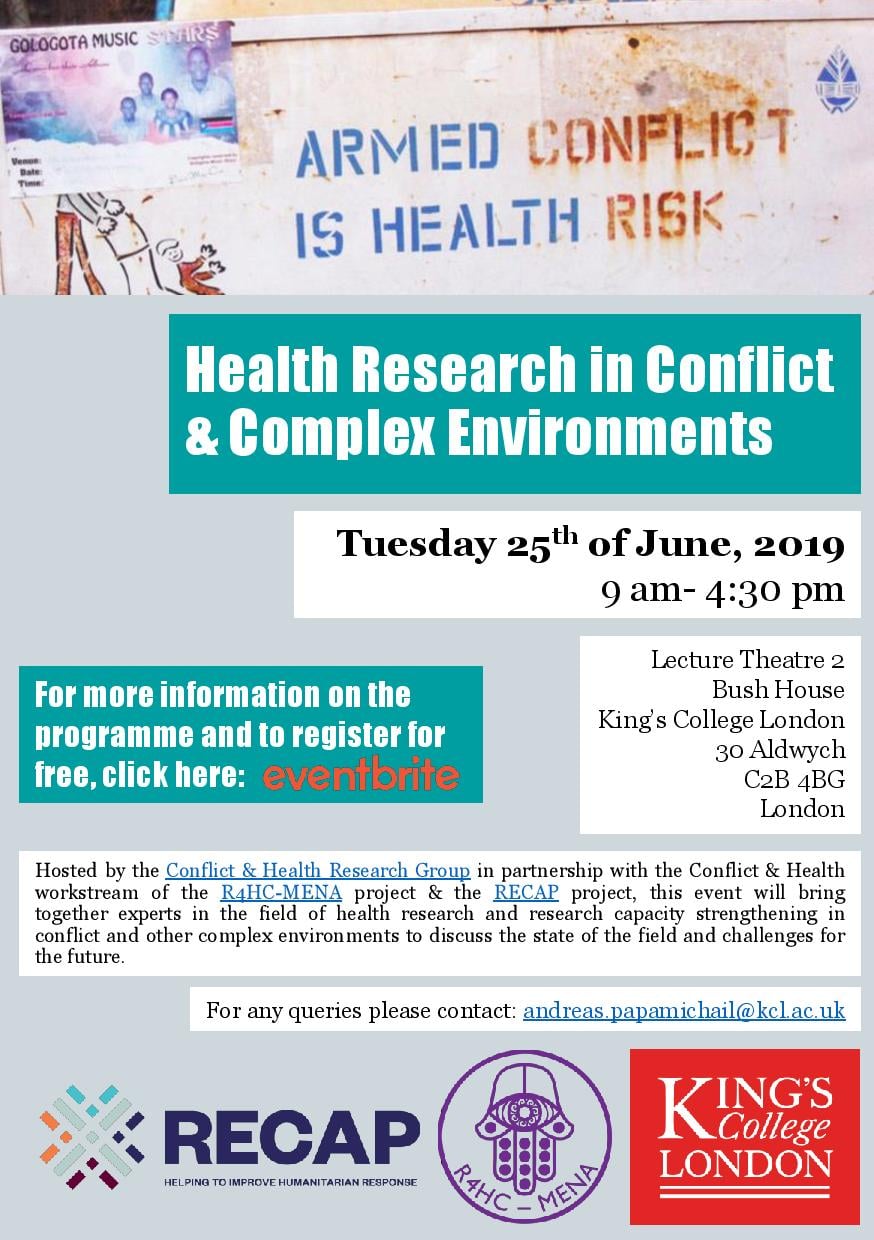
The second training workshop of the Towards Leadership Programme took place this week in London and was hosted by our partners, the Crick African Network at the Francis Crick Institute.
The final training workshop for the 2018/2019 cohort will take place in Nairobi, Kenya, in November 2019.
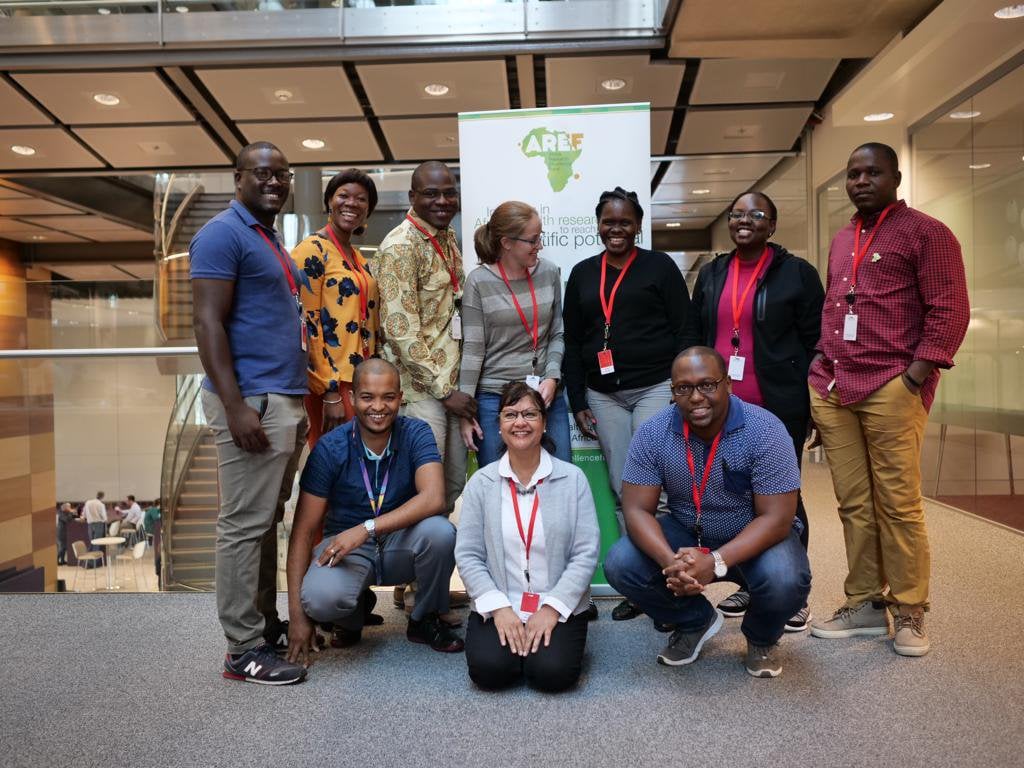
In March 2019 RECAP's Dr. Christopher Jarvis was deployed to Mozambique in response to Cyclone Idai as part of his role as a volunteer with Mapaction. He provided mapping and information support to the humanitarian response and was involved in large-scale multi-agency rapid aerial survey of the affected populations. He worked alongside multiple groups including the United nations, International Federation of the Red cross, WHO, and the Mozambique Government. He was able to utilise the expertise gained as part of RECAP to responds in real time to the emergency and gained experience which will help inform future research and capacity strengthening such as during recent courses conducted in Benin, Beirut, Barbados and on site training provided to staff in Goma for the DRC Ebola response.
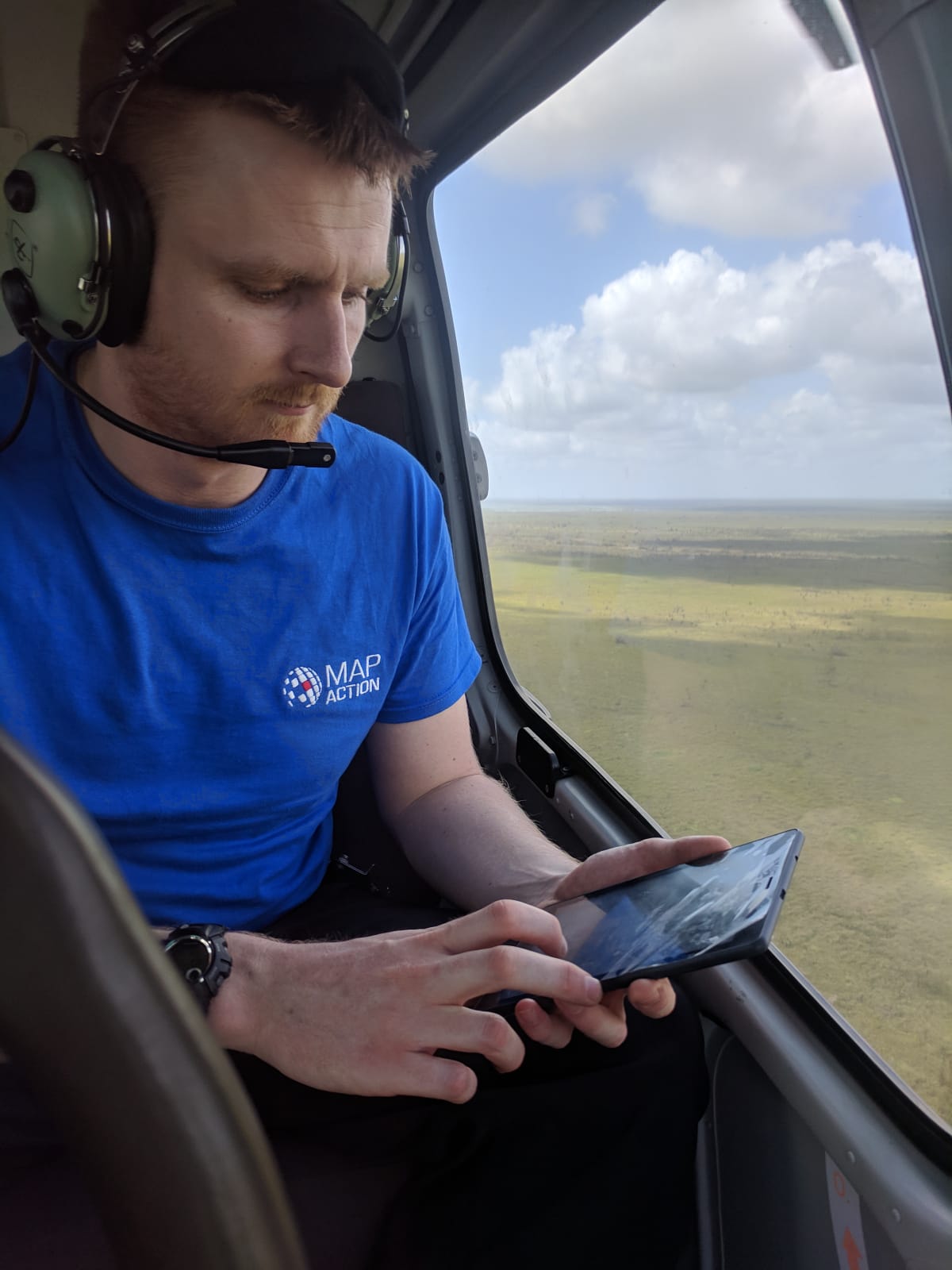
RECAP partners attended a three day training workshop funded by the Global Impact Accelerator Accounts. The workshop was facilitated by the Knowledge to Policy Center and the American University of Beirut was was attended by researchers, policymakers, and NGO representatives from nine different countries.
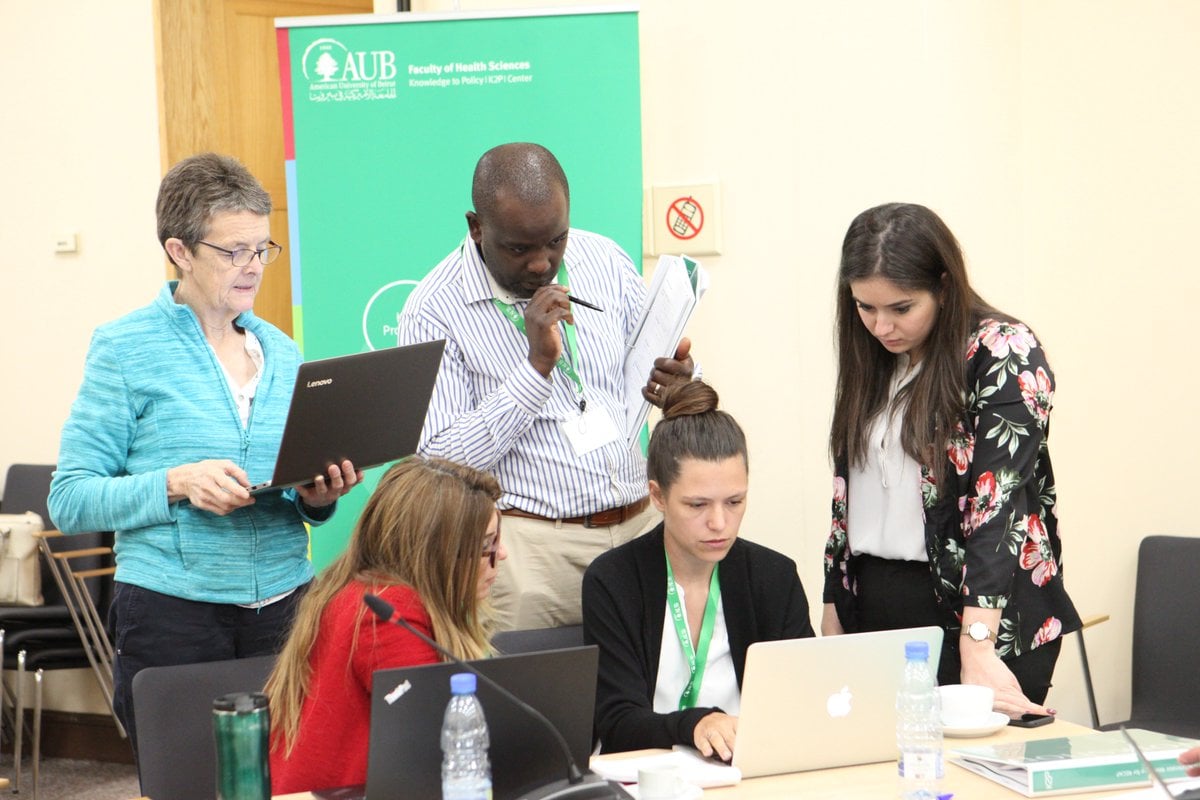
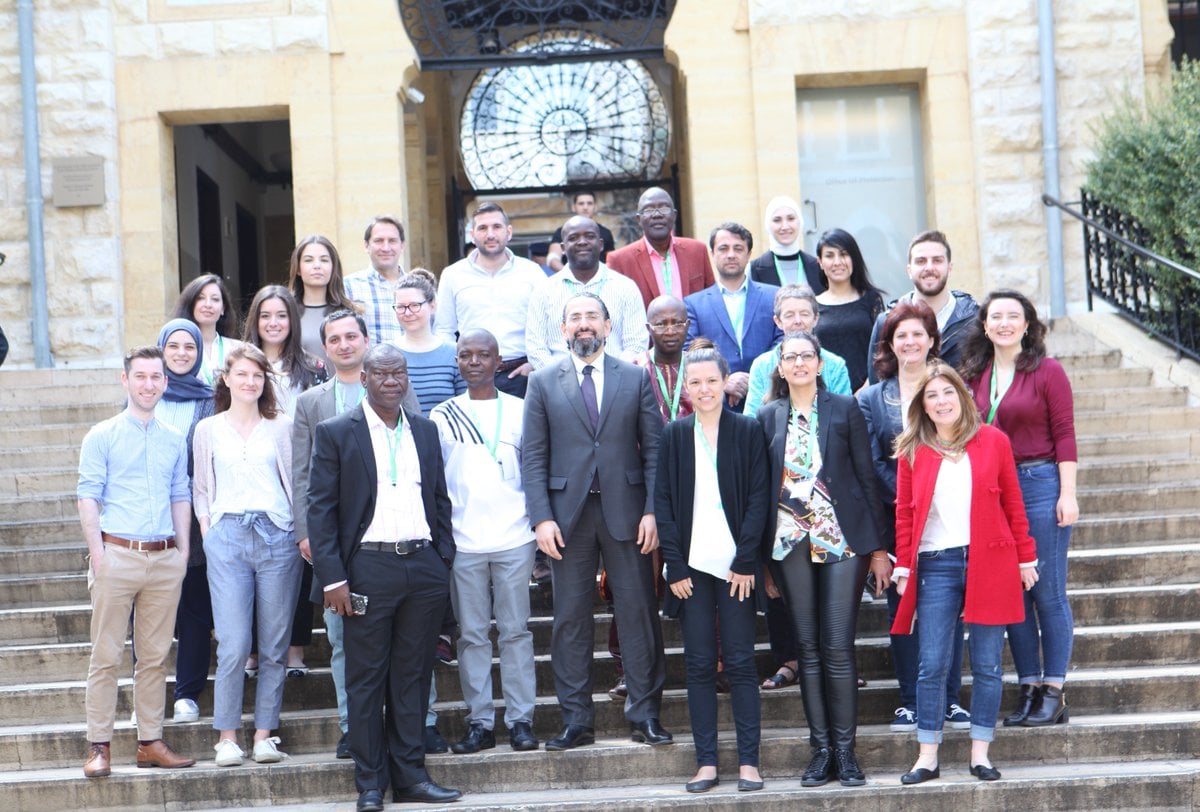
On 4 & 5 March 2019 Dr Munshi Sulaiman from RECAP Partner BRAC, and Dr Zia Sadique and Dr Gulia Greco from LSHTM lead a short course on Economic Evaluation for Health Interventions in Kampala, Uganda.
The course, which has received excellent feedback, was attended by participants from BRAC, The University of Sierra Leone, The Centre for Disease Control, the UK Department for International Development, the International Development Research Centre, The International Rescue Committee, Save the Children, UNFPA and USAID.
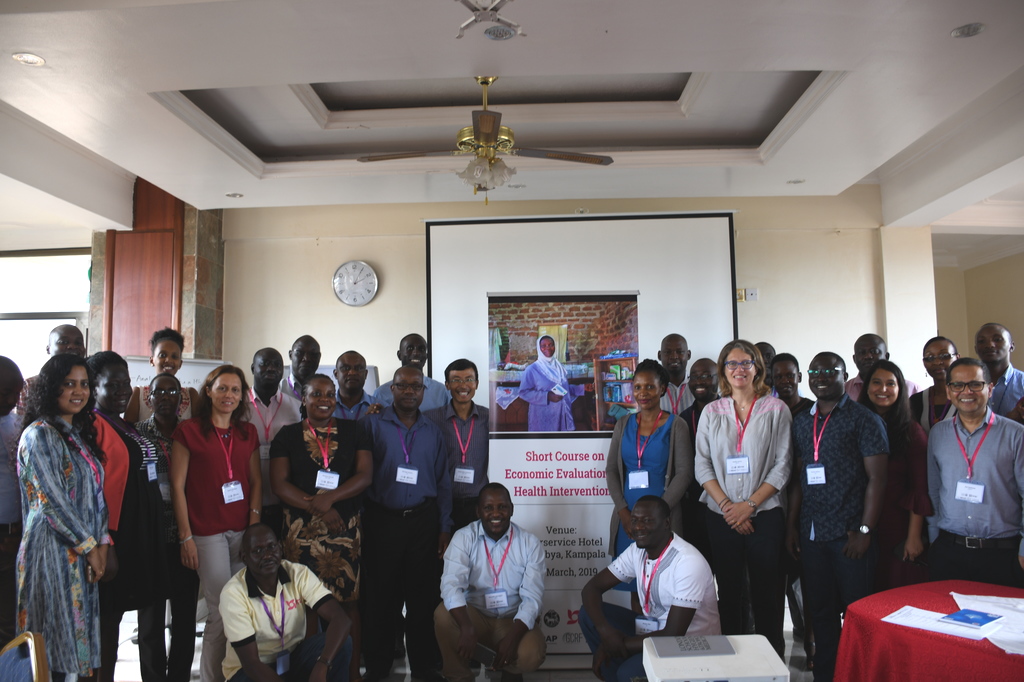
RECAP is partnering with two other GCRF GROW funded projects, the Crick African Network and PRECISE, to build leadership capacity in research institutues across Africa.
The first workshop of The Towards Leadership Programme, facilitated by the African Research Excellence Fund (AREF), was held last week in Johannesburg, South Africa and was attended by two RECAP delegates, Ayesha Idriss and Dr Edries Tejan from the University of Sierra Leone.
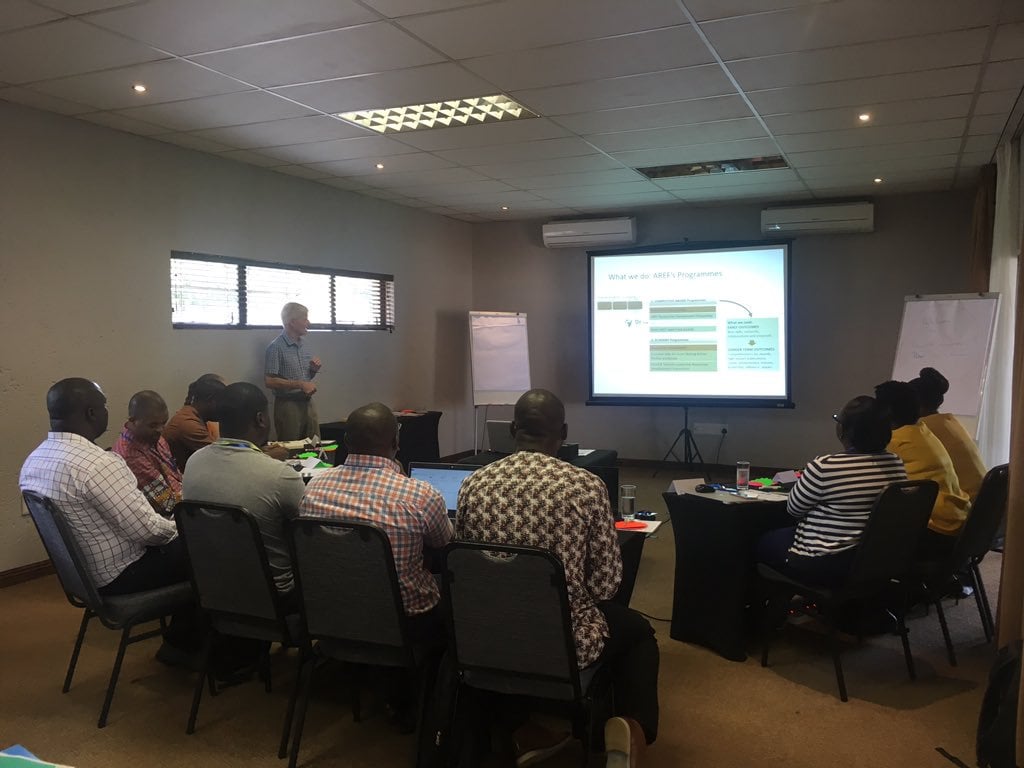

On 15 & 16 January 2019 RECAP Partners gathered together in Beirut for the project's Annual General Meeting hosted by our partners the American University of Beirut. The two day meeting consisted of presentations and panels chaired by RECAP project partners and guests from AUB and the Nuffield Council on Bioethics.
A two day course will be run by RECAP researchers Dr John Edmonds and Dr Chris Jarvis at the American University of Beirut in January 2019. Please see the advert for further information.
Date: January 17-18, 2019
Location: American University of Beirut, Beirut, Lebanon
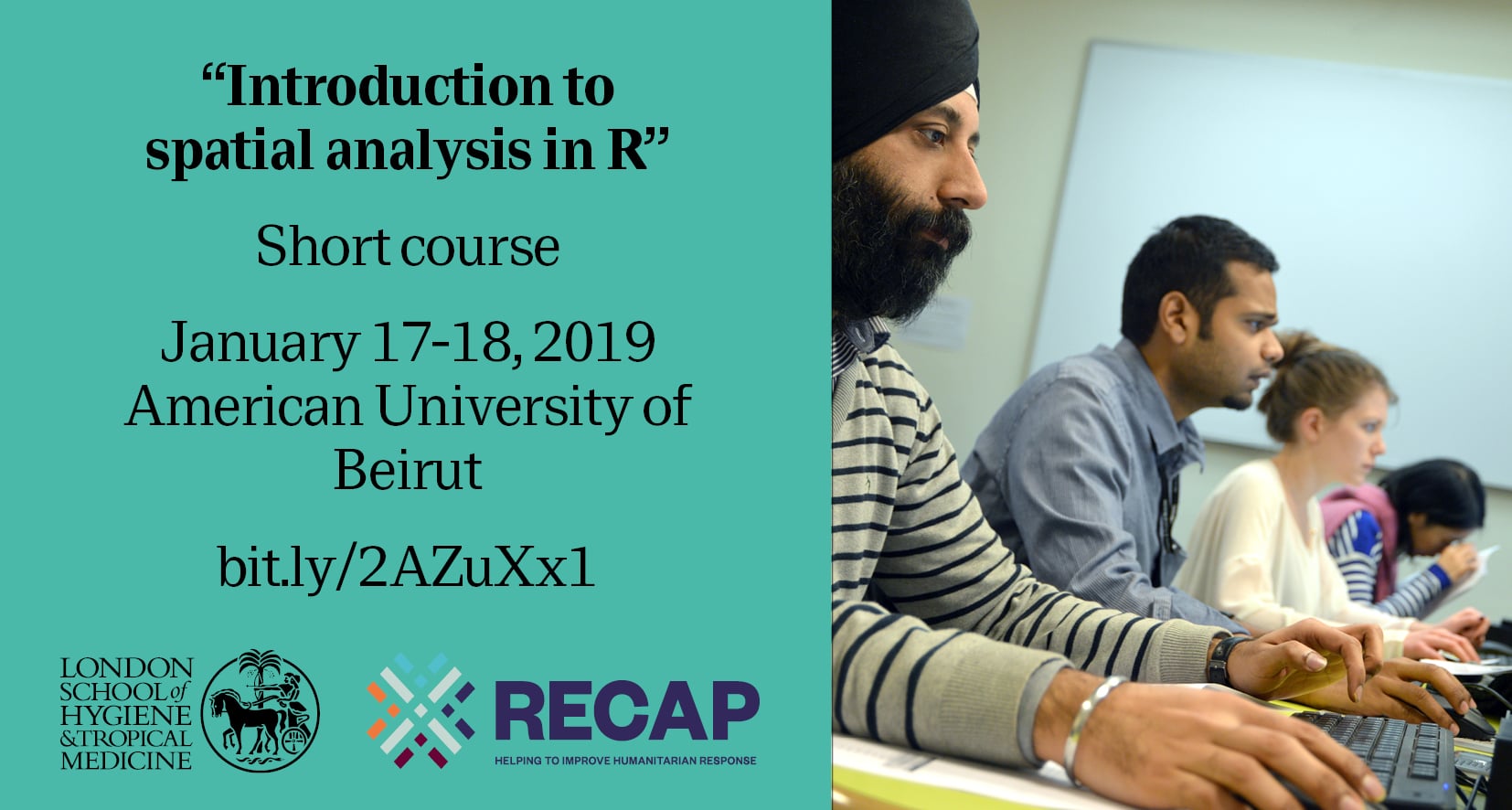
A RECAP project event was held in Freetown, with presentations by the Minister of Higher Education, the Chief Medical Officer, the Statistician General of the Government of Sierra Leone, senior representatives of the University of Sierra Leone, students and staff from the University of Sierra Leone, and RECAP staff from the London School of Hygiene and Tropical Medicine.
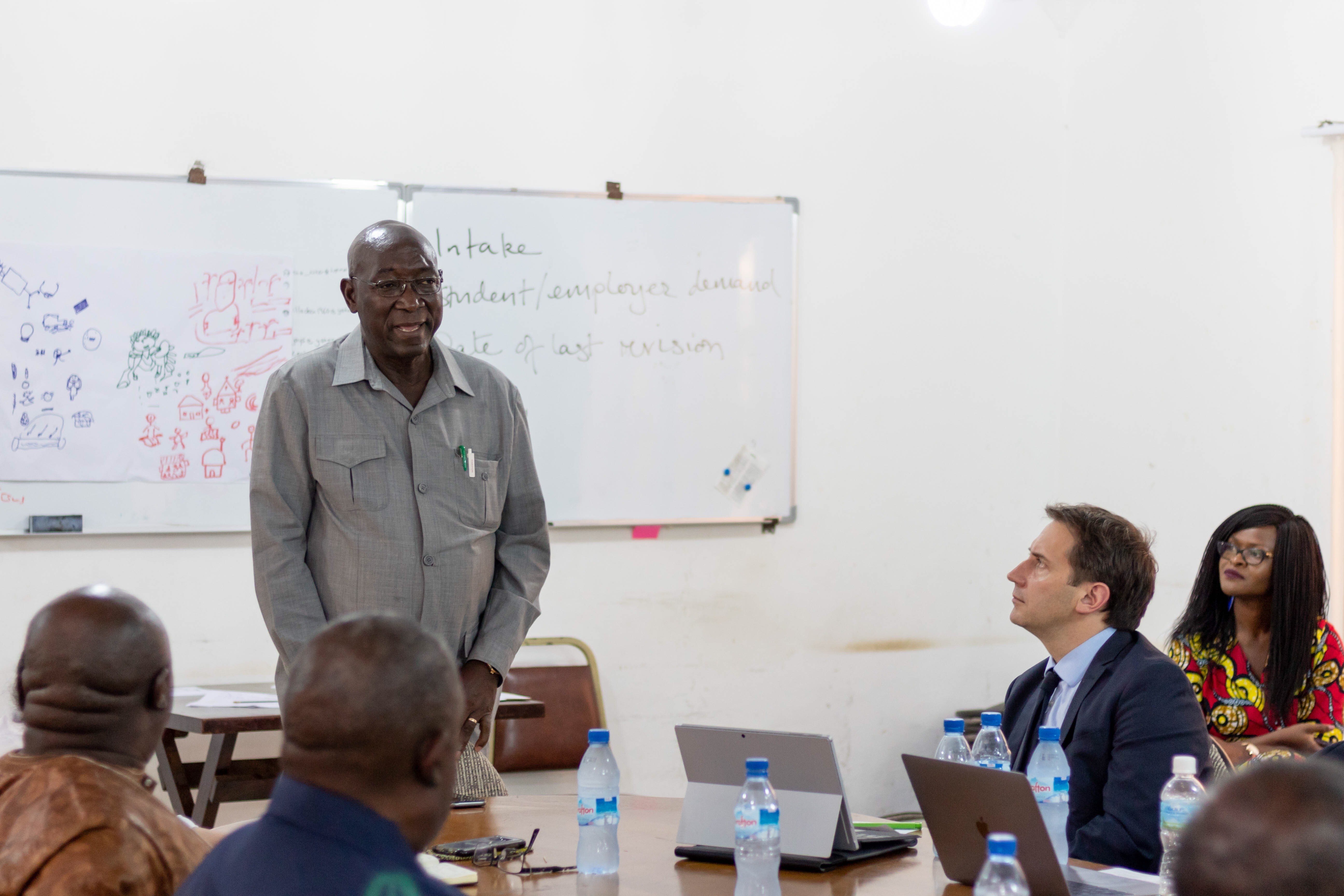
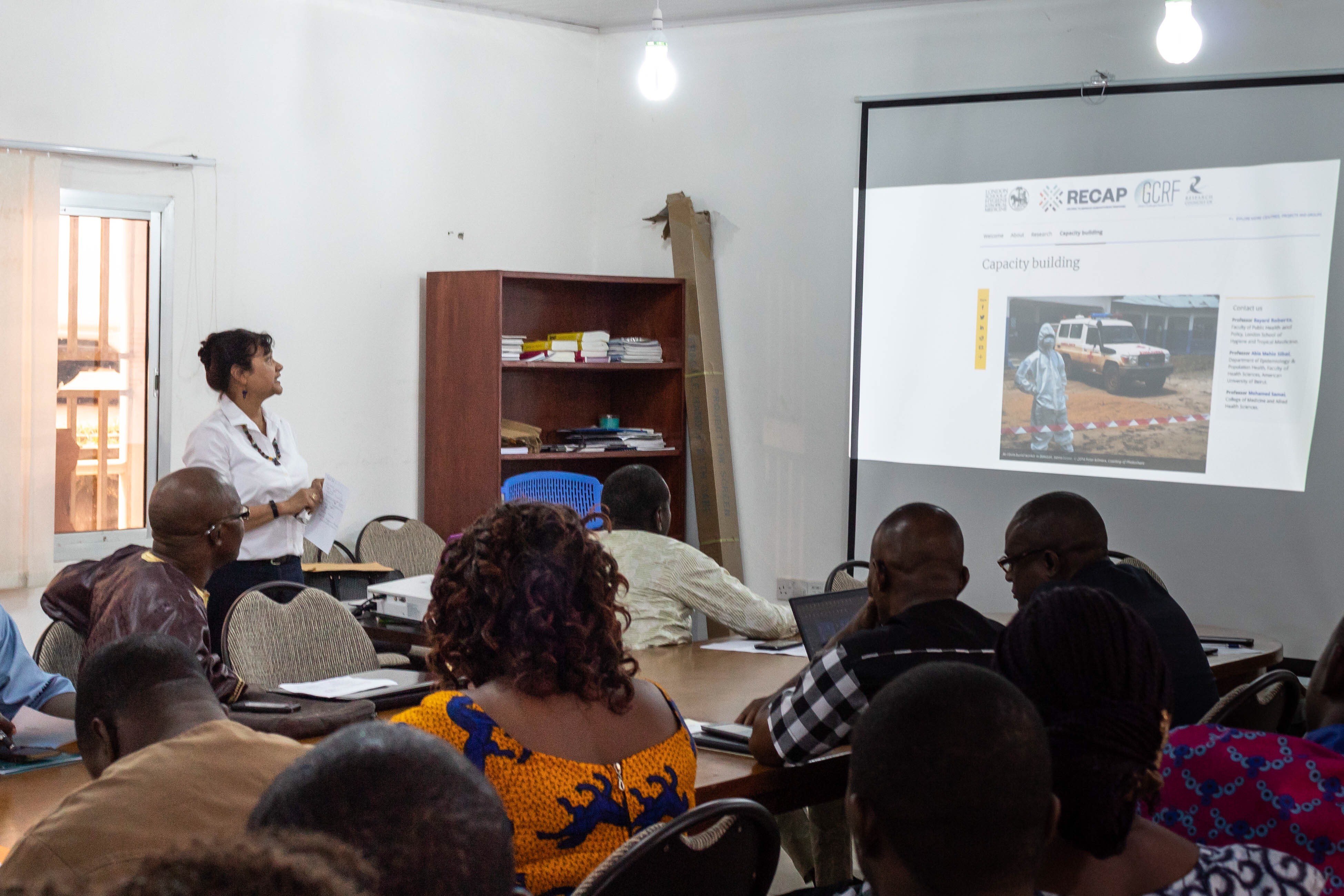
Prof Bayard Roberts, RECAP PI, presents at the Houses of Parliament on 22 November for the launch of a new practice guide on the use of evidence in the humanitarian sector. This practice guide was led at LSHTM by Dr Karl Blanchet and supported by RECAP. For further details please see Evidence Aid - Use of Evidence in Humanitarian Settings
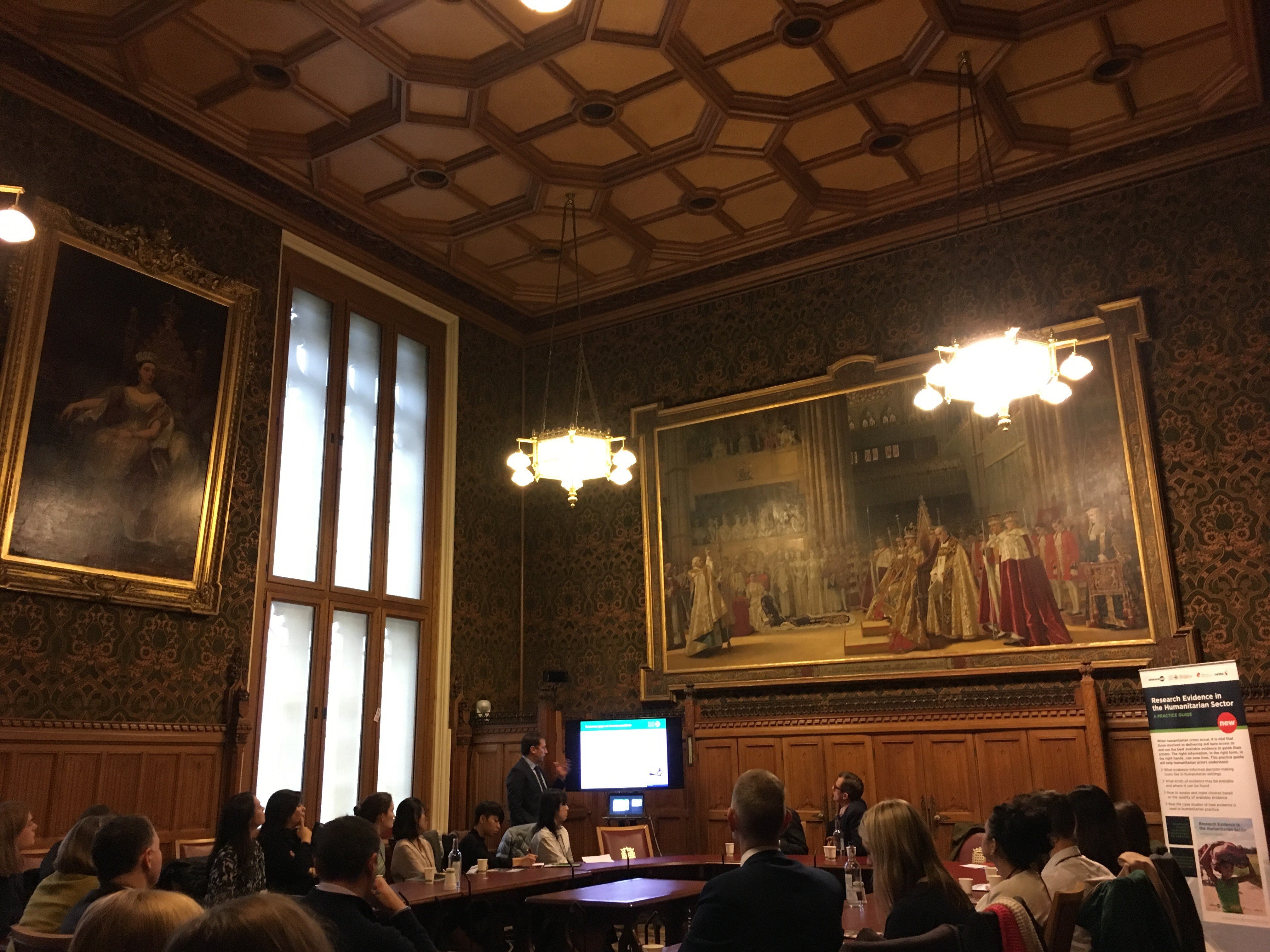
Bayard Roberts spoke about RECAP as part of his presentation on ‘forced migration: gaps in mental health research and accountability‘ at a colloquium on Forced Migration and Humanitarian Policy held at Yale University on 4 October 2018.
Tim Allen (RECAP), Anna Macdonald and Henry Radice have recently published Humanitarianism: A Dictionary of Concepts (London: Routledge, 2018) a collection of 24 pithy and provocative essays engaging with a selection of established and emerging topics crucial to the understanding of contemporary humanitarianism with contributions from several RECAP researchers including RECAP PI Prof Bayard Roberts, and Dr Melissa Parker.
RECAP is pleased to announce the release of ‘Research Evidence in the Humanitarian Sector: A Practice Guide.’ This was written in collaboration with Evidence Aid and Nesta, and involved RECAP Co-Investigator, Dr Karl Blanchet
This guide is intended for humanitarian decision-makers and practitioners working in the field or with donor, international, national, or non-governmental organisations. It is intended to help with decisions around financing, supervision, delivery, or evaluation of humanitarian interventions. It defines evidence-informed decision making, explores when and which evidence may be of use, and advises how to choose evidence, where to source it from, and how to assess the quality.
Read the full report here.
If you have any further questions, please contact Karl Blanchet (karl.blanchet@lshtm.ac.uk).
Recent updates
The Refugee Law Initiative (RLI) has been working with prominent international NGO’s – Save the Children and the International Rescue Committee - to support hum
Events
Newsletter
Contact us
Professor Bayard Roberts, Faculty of Public Health and Policy, London School of Hygiene and Tropical Medicine.
Professor Abla Mehio Sibai, Department of Epidemiology & Population Health, Faculty of Health Sciences, American University of Beirut.
Professor Mohamed Samai, College of Medicine and Allied Health Sciences, The University of Sierra Leone
Daniel Mongiardi, RECAP Project Manager, London School of Hygiene and Tropical Medicine
Recent updates
The Refugee Law Initiative (RLI) has been working with prominent international NGO’s – Save the Children and the International Rescue Committee - to support hum
Events
Newsletter
Contact us
Professor Bayard Roberts, Faculty of Public Health and Policy, London School of Hygiene and Tropical Medicine.
Professor Abla Mehio Sibai, Department of Epidemiology & Population Health, Faculty of Health Sciences, American University of Beirut.
Professor Mohamed Samai, College of Medicine and Allied Health Sciences, The University of Sierra Leone
Daniel Mongiardi, RECAP Project Manager, London School of Hygiene and Tropical Medicine

